








































Over half a century ago, a group of local visionaries gathered to lay the foundation for an event that would soon become the largest open house showcasing the best of the home building industry. Their legacy continues as a tradition in the heart of Carolina rooted in history, craftsmanship, and community. Join us on a tour of over 150 homes and experience the best in design trends, décor and innovative technology.
September 30 - October 1, 6-8, 13-15 12 p.m. - 5 p.m.
Green Front is proud to be an official sponsor of the Parade of Homes. Pick up your Parade Guidebook and join us on the Parade.
Table by Hickory White, Console by Hekman Furniture Company, Tray by Uttermost, Art by Leftbank, Accessories by A & B Home, etúHOME and Chelsea House










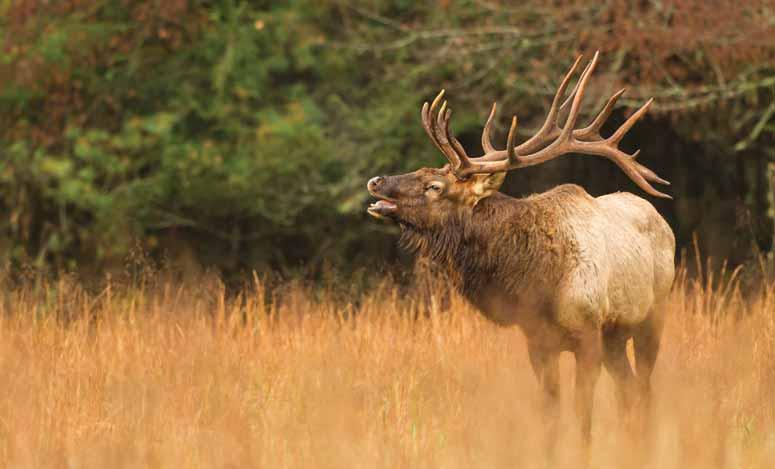


29EXPLORE: It’s Cryptic
Rambling
36CELEBRATE: Tricks & Treats Costumes inspired by iconic
39NATURE: Elk in Our Mountains The return of the majestic animals
43ART: Careful Chaos
Painter Chieko Murasugi
46SIMPLE LIFE: Farewell to Golf …but not just yet!



49 What I Kept by Kelly White Arnold illustration by Jenn Hales
50 Rooted in Raleigh
Whitney Otto’s passion for design shines in her family-friendly home by Hampton Williams Hofer photography by Catherine Nguyen
62Giving Garden
Preston Montague’s urban garden has a deeper mission by Colony Little photography by Kate Medley
66 Creative Pursuits
Daniel and Susan Woodard
Kelly’s airy handmade home by Addie Ladner
photography by Taylor McDonald
74 On the Grounds
Celebrating 170 years of the N.C. State Fair by Joel Haas
photography by Justin Kase Conder

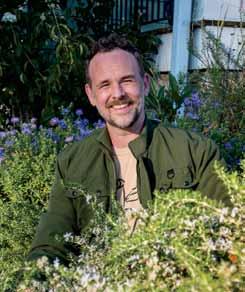



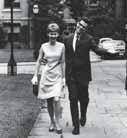
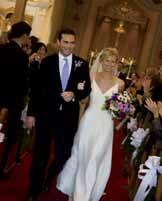

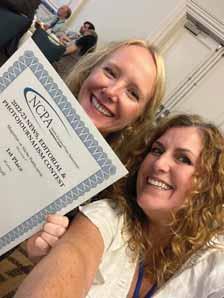

Tor Niche Publication! Addie and Laura were very excited.
his month, my husband Josh and I will celebrate 15 years of marriage. They’ve been good ones: three homes, two sweet daughters, lots of adventures. But as anyone who’s been in this kind of long-term partnership knows, it comes with challenges. And one of them, for us, is building furniture together.
Over the course of our relationship, we’ve gone from living in a small apartment together to our current, family-sized house. And while we do have a few nice pieces of furniture in our home — mostly passed-down antiques or vintage pieces found locally — we’ve tended to decorate with our eye toward a budget. (Who wants to spend a lot of money on something your kids will cover with glitter glue?)
So we have our fair share of pieces from the likes of IKEA, Target and World Market — most of which we’ve assembled ourselves. Each brand seems to have its own language in the instruction manuals, as well as its own hardware to put it together.
Josh and I have different approaches to building things. I want to take inventory and read the directions start-to-finish first — he’s ready to just get going. Frustration ensues. More than once, we’ve gotten most of the way through a project and had to go back three steps because we installed something upside down or backwards. More frustration.






One furniture build stands out. When our youngest was just 14 months old, she started climbing out of her crib. Time for a big-girl bed! She and her sister were sharing a tiny room, so we decided to bunk them up. We did a lot of measuring and shopping and found the perfect one at IKEA. It would be exactly the right size to fit across the short end of the room, freeing up tons of space!
We set the kids up to play at a neighbor’s house and got to work. We listened to music, worked steadily, and built the bunk bed without arguing, for the first time ever!
Then we went to rotate it into position — and it didn’t fit.
We figured out a solution, placing it along the long end of the room. It wasn’t the vision, but it worked. And I still consider that day a triumph.
Since then, we have built many more pieces together, each time a little more smoothly, despite inevitable setbacks. Seems like a good omen for the next 15 years.
 Ayn-Monique Klahre Editor
Ayn-Monique Klahre Editor


Editor
OCTOBER 2023
AYN-MONIQUE KLAHRE ayn-monique@waltermagazine.com
Creative Director
LAURA PETRIDES WALL laura@waltermagazine.com
Publisher DAVID WORONOFF
Advertising Sales Manager JULIE NICKENS julie@waltermagazine.com

Associate Editor
ADDIE LADNER addie@waltermagazine.com
Contributing Writers

Senior Account Executive & Operations CRISTINA HURLEY cristina@waltermagazine.com
Events Coordinator KARLIE MARLOWE events@waltermagazine.com
Finance STEVE ANDERSON
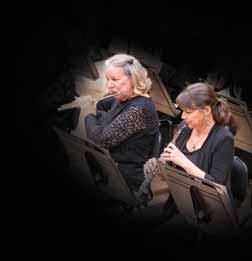
Kelly White Arnold, Jim Dodson, Mike Dunn, Joel Haas, Hampton Williams Hofer, Colony Little, David Menconi, Liza Roberts, Lori D. R. Wiggins
Contributing Poetry Editor Jaki Shelton Green
Contributing Copy Editor Finn Cohen
Contributing Photographers
Justin Kase Conder, Rob Hammer, Taylor McDonald, Kate Medley, Catherine Nguyen, Joshua Steadman
910-693-2497
Distribution JACK BURTON
Inquiries? WALTER OFFICE 984-286-0928
Address all correspondence to: WALTER magazine, 421 Fayetteville Street, Suite 104 Raleigh, N.C. 27601


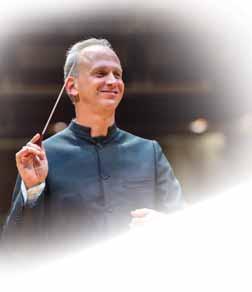
Contributing Illustrators Jenn Hales, Gerry O’Neill
WALTER is available by paid subscriptions for$36 a year in the United States, as well as select rack and advertiser locations throughout the Triangle. Subscribe online at waltermagazine.com/subscribe
For customer service inquiries, please email us at customerservice@waltermagazine.com or call 984-286-0928
WALTER does not accept unsolicited manuscripts.
Please contact Ayn-Monique Klahre at ayn-monique@waltermagazine.com for freelance guidelines.
Owners
JACK ANDREWS, FRANK DANIELS III, LEE DIRKS, DAVID WORONOFF In memoriam FRANK DANIELS JR.
© WALTER magazine. All rights reserved. No part of this publication may be reproduced in any form without the express written consent of the copyright owner. Published 12 times a year by The Pilot LLC.
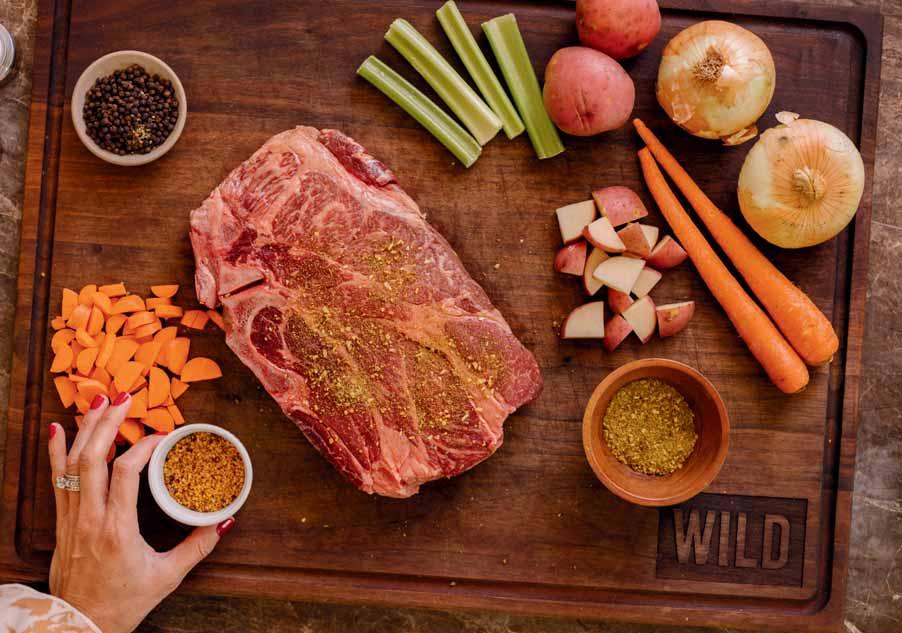






PART OF THE FABRIC OF RALEIGH SINCE 1899
PART OF THE FABRIC OF RALEIGH SINCE 1899
Our patients receive state-of-the-art care in a warm, professional, safe and friendly environment. We welcome new patients!
Our patients receive state-of-the-art care in a warm, professional, safe and friendly environment. We welcome new patients!
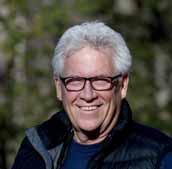
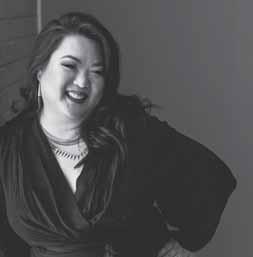
OUR SIGNATURE SERVICES INCLUDE:
OUR SIGNATURE SERVICES INCLUDE:
Comprehensive & Cosmetic Dental Care
Comprehensive & Cosmetic Dental Care
Same-Day CEREC Crowns
Same-Day CEREC Crowns
Suresmile Clear Aligner Orthodontics
Invisalign Orthodontics
Dental Implants
Dental Implants
Sleep Apnea
Sleep Apnea TMJ Therapy
TMJ Therapy


919-782-0801
New location: 3201 Glenwood Ave. Suite 301 Raleigh, NC 27612 • 919-782-0801
www.drgregweaver.com
www.drgregweaver.com
Mike Dunn is a retired naturalisteducator living in a patch of woodlands in Chatham County. Through work with North Carolina State Parks, the NC Museum of Natural Sciences and the NC Botanical Garden, he’s shared the wonders of nature with people of all ages for almost 40 years. He now enjoys photographing nature and sharing his observations through his monthly column and his blog, roadsendnaturalist.com “There is nothing quite like being in a mountain valley at sunrise, seeing and hearing a huge bull elk as he struts out across a frostcovered meadow. It’s a link to our past and a reminder of what can be accomplished in the name of wildlife conservation.”


Colony Little is an arts writer and critic based in Raleigh. Her work has been featured in ARTnews, Hyperallergic, The Art Newspaper and W Magazine. “It was such a pleasure to speak with Preston Montague about his garden transformation. As a visual artist, he has a strong eye for color, line and pattern that serves him well in his landscape architecture practice, however it was through the travails and triumphs of his own yard that he learned about the importance of observing and adapting. It’s a powerful metaphor for life that also speaks to his entrepreneurial, educational and activist sensibilities.”
CATHERINE NGUYEN / PHOTOGRAPHER
Catherine Nguyen is a Raleighbased advertising and editorial photographer specializing in residential and commercial interior design. A New York native, Nguyen has a background in visual design, branding and marketing. After realizing her passion for creative pursuits, she attended The Academy of Art in San Francisco to study photography. Her work has been published in Architectural Digest, Vanity Fair and Elle Décor “When I walked into Whitney Otto’s home, I knew it was going to be a very good day. She left nothing to chance; every space was not only beautifully designed, but impeccably styled.”

Taylor McDonald is an architectural and commercial photographer from Raleigh. In 2015, she graduated from The Savannah College of Art & Design with a BFA in photography. She now resides in Durham. As the granddaughter of an architect, Taylor feels a deep connection to her subject matter. Both her personal and professional work seek to explore humanity and the places we call home. “Susan and Daniel’s 1940s home tells a beautiful story of family and creativity. You can see this through paintings they’ve created on the walls, the beautiful studio out back and mementos like their collections of seashells.”

Dr. Victoria Gallagher was pleased with the story about the NC Freedom Park.
We got lots of compliments on the feature of Debbie and Larry Robbins’ home…
“Wow. It’s stunning. And the artwork!”
— Gail van Matre
“Exquisite art, gorgeous home and interior design, and great photos too!”
Elizabeth Laul Healey
“A wonderful space with an incredible collection!”
— Evan Reid
“What a beautiful home for two wonderful people!”
— Doug Smith
“I have had the pleasure of being in this wonderful home. Elegant, artful and welcoming.”
— Bill Allen


“Rarely are high expectations exceeded, but that’s what happened when we moved to The Cypress of Raleigh. If you want to develop meaningful friendships, engage in fun and interesting activities, and have the peace of mind that Cypress is the place to be.”



Happy fall, y’all! This month, enjoy pumpkins in various ways, outdoor festivals and some great live music.
by ADDIE LADNER

SHEPHERD’S WAY FARM


All month | 9 a.m. - 6:30 p.m.
Whether you like a classic orange carving pumpkin, subtly colored heirloom gourds or flat-topped pumpkins for stacking, Shepherd’s Way Farm has a pumpkin for you. Based in Laurel Springs, this seventh-generation farm has been providing pumpkins to the Triangle since 2008, a longtime fixture in North Hills and, in recent years, The Village District. “We bring the farm to Raleigh,” says farmer Tim Moses. Shepherd’s Way now grows more than 80 different varieties of the gourd. “Growing pumpkins started as a rotational crop on our Christmas tree farm, but has grown into a labor of love for us. We have made many memories over the years providing pumpkins and seasonal decorations to our friends, family and customers,” says Moses. Free to visit; 1010 St. Albans Drive or 13044 Norwood Road; shepherdswayfarmsnc.com
ZAC BROWN BAND
Oct. 5 | 6:30 p.m.
Zac Brown Band — a multiple Grammywinning, nine-member folksy rock group based in Atlanta — is coming to Walnut Creek Amphitheatre on its From The Fire Tour. Hear the band play now-classic country tunes like “Chicken Fried,” “Knee Deep” and “Colder Weather,” perfect songs for fall. King Calaway, a country band whose members hail from the United States, Scotland and Gibraltar, will open the show. From $41; 3801 Rock Quarry Road; zacbrownband.com
KEVIN NEALON
Oct. 5 - 7 | Various times
If Saturday Night Live, Weeds and Adam Sandler films are on your viewing rotation, you probably know awardwinning comedian Kevin Nealon. This month, he’s taking the mic at Goodnights Comedy Club. No topic is off-limits with Nealon, who’s known for his conversational dialogue and sarcasm. From $27; 401 Woodburn Road; goodnightscomedy.com
Oct. 6-8 | 6:30 p.m.
Founded in 2012 by Christopher Terrell, the Raleigh Film & Art Festival showcases work from independent filmmakers, painters and theater artists. Hosted at NC State’s Centennial Campus, this three-day festival will showcase more than 200 independent films in categories including shorts, feature, animated and documentary. One of those films will be Who Am I?, a short by North Carolina native Alex Ellis that follows Grammy-nominated rapper Petey Pablo on a therapy session that turns into a musical fever dream. “I wrote this piece because I want to normalize getting help — there is still such a stigma around it, especially in the Black community,” says Ellis. “I
All information is accurate as of press time, but please check waltermagazine.com and the event websites for the latest updates

Appreciating family and friends starts by planning your stay in the Crystal Coast. Enjoy 11 unique communities, 85 miles of coastline, and endless fun for all ages. We’re shaped by water, and after you visit, you will be too. See seasonal specials on amazing hotels and vacation rentals at CrystalCoastNC.org.
want to make going inward a safer space for all, and Petey was the perfect person for this given his desire to change for the better.” From $4; 1840 Entrepreneur Drive; raleighfilmandartfestival.com
Oct. 7 | 10:30 a.m.
If you or someone you know are affected by Alzheimer’s, consider walking or giving to support research to combat the disease. Hundreds will gather around the Halifax Mall to participate in the Triangle’s Walk to End Alzheimer’s. It’ll be a sea of color: blue for someone living with Alzheimer’s or another dementia, purple for those who have lost someone to the disease and yellow for people offering care or support. The walk is part of the annual international program that has garnered more than 300,000 participants in the United States. There’s no registration fee, but walkers are encouraged to participate in fundraising. Free but fundraising encouraged; 300 N. Salisbury Street; act.alz.org
Oct. 7 | 11 a.m. - 6 p.m.
The City of Raleigh, Dix Park Conservancy and Shop Local Raleigh are coming together to celebrate autumn in the heart of Raleigh. Held at Dix Park’s Big Field, Fall for Local will include a giant pumpkin patch, miniature animals, inflatables, hay and tractor rides, live music, photo booths and more. “It’s the perfect way to kick off the season,” says Jennifer Martin, executive director of Shop Local Raleigh. Food trucks like Hot Chix Hotcakes and Chicken, Ultimate Eggrolls, Hollywood Taco Shop and Geluna Gelato will be selling bites for purchase, along with beverage vendors. Free admission; 101 Blair Drive; shoplocalraleigh.org
Oct. 7 | 9 a.m. - 12 p.m.
Help keep Falls Lake clean by joining this community event held annually at Blue Jay Point County Park on the
Oct. 21 | 10 a.m. - 2 p.m.
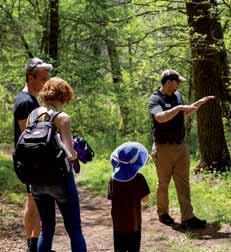
Celebrate the outdoors at the George and Julia Brumley Family Nature Preserve in Chapel Hill. Hosted by Triangle Land Conservancy, community groups including Schoolhouse of Wonder, Outdoor Afro, Feminist Bird Club and BLK Hiking Club will offer family-friendly, inclusive activities. Hike the trails, look for wildlife and participate in nature-themed crafts at this 600-acre sanctuary complete with a labyrinth, historic structures and ponds. Food and drink options will be available for purchase. Free admission; 3055 New Hope Church Road, Chapel Hill; triangleland.org
shores of this 12,000-acre body of water that spans three counties. Participants must be over 8 years old, and closed-toe shoes, a hat and sunscreen are recommended. Cleanup supplies provided! Free but registration required; 3200 Pleasant Union Church Road; wake.gov
Oct. 8 | 3 - 4 p.m.
Hear Carol Ann DeLaRosa read from her Raleigh-set novel, Shoeless, at Oberlin Regional Library in The Village District. The story is about a Catholic mother and lawyer who is surprised when she reencounters a Saudi Arabian lawyer she met on a cruise decades before. Stay for a Q&A discussion to learn more about this local author’s storytelling process and inspiration. Free; 1930 Clark Avenue; wake.gov
Oct. 12 - 22 | Various times
The fair is back, for the 170th year! Whether you’re in it to wonder at the giant pumpkins, fancy chickens and livestock showcases in the Agri Supply Expo Center or ready to thrill yourself
with the rides in the Midway and deep-fried food, there’s something for everyone. There will be fireworks every night, themed days and many musical acts, so visit the website to pick the day that suits your schedule. Learn more about its history on page 74. From $8; 4285 Trinity Road; ncstatefair.org
Oct. 12 - 29 | Various times Arcadia, by Tom Stoppard, is a playful production that explores the relationship between history and current day and contemplates what’s guaranteed in life. The story starts with a curious girl enthralled with science and math who captures the heart of her older tutor in the early 1800s. In the present day, researchers scour her home to learn more about their story. “I saw the original production at Lincoln Center in the early 1990s and was blown out of my chair by its capacity to thrill and present so many ideas,” says director and Burning Coal cofounder Jermone Davis. “It’s about a time, place and people that none of us have any connection to, except the connection that matters — the human one.” From $5; 224 Polk Street; burningcoal.org
Oct. 17 | 7 p.m.
Longtime music writer and WALTER contributor David Menconi will be at Quail Ridge Books talking about his latest book, Oh, Didn’t They Ramble. The book follows the origins of Rounder Records, a music label born in the 1960s that helped popularize and distribute American folk music. (Read an excerpt on page 33.) The ticket price includes a copy of the book. $28.50; 4209-100 Lassiter Mill Road; quailridgebooks.com
Oct. 19 | 10 a.m.
In partnership with its Hillsborough Street neighbor, the Alexander Family YMCA, the Gregg Museum of Art Design at NC State University will offer morning yoga in the museum’s main lobby. Led by longtime yogi Jeff Manning, this is a convenient way to stretch your muscles and relax your mindset in
one of Raleigh’s best-kept secrets. Bring your own mat or beach towel and take some time to walk the museum and campus grounds afterward. Free; 1903 Hillsborough Street; gregg.arts.ncsu.edu
Oct. 26 | 6 - 9 p.m.
Since 2001, Healing Transitions has offered no-cost life-saving services to individuals battling addiction through outreach and recovery programs, family services, non-medical detox and an emergency drop-in shelter. Support that work at its annual fundraiser, Art of Recovery. This year, it centers on the theme of hope, with Sounds of Hope (live music), Movement of Hope (a performance by NC Theatre), Taste of Hope (local food trucks) and Visions of Hope (art for auction). Adriana Ameigh, Adam Cohen, Caitlin Cary and Suzanne Crawford are among the nearly 20 local artists whose work will be up
for bidding. Suggested donation $58; 1030 Richardson Drive; healing-transitions.org
SHANIA TWAIN
Oct. 18 | 7:30 p.m.
Canadian country music star Shania Twain is “still the one” we want performing in Raleigh! She’ll visit PNC Arena on tour for her 2023 album, Queen of Me, the first one she’s released in five years. Contemporary countrypop artist Lily Rose will open the show. From $66; 1400 Edwards Mill Road; pncarena.com
Oct. 20 | 7 - 9:30 p.m.
Wear your favorite boots and denim for an evening of square dancing at Transfer Co. Food Hall hosted by PineCone and NC Square. Enjoy tunes by the Trianglebased string band Blue Star Travellers as you hone your dance moves. Come early







A course unlike any in the Pinehurst canon, No. 10 arrives in its full, natural splendor mere weeks ahead of the 2024 U.S. Open. Experience Tom Doak’s bold design beginning April 3, 2024 with our Premier Golf Package, where you can play No. 2, No. 10 & The Cradle . . . and unlimited additional rounds. *










and take advantage of the food hall’s offerings like Che Empanadas, Chhote’s and Bul Box. All ages are welcome and no previous square dancing experience is required. Suggested donation $10; 500 E. Davie Street; pinecone.org

Oct. 21 | 2 - 6 p.m.
Now Serving (originally named The Sunday Supper) was formed in 2022 by community members and chefs to raise money to help people affected by Hurricane Mattthew. Since then, more than 72,000 meals have been fed to under-resourced communities. At this fundraiser in Smoky Hollow, you can help grow that number by sampling dishes from more than 20 local chefs and food purveyors, including Cheeni Indian Food Emporium, Cortez, Hummingbird, Madre, Mandolin, Midwood Smokehouse, O-Ku, Stanbury, Standard Beer + Food and St. Roch Fine Oysters + Bar. Also enjoy wine and spirits, live music and cooking demonstrations. $75; 421 N. Harrington Street; nowservingnc.org



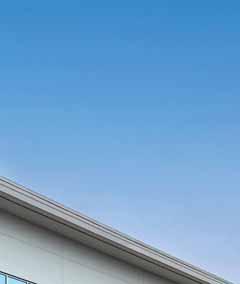
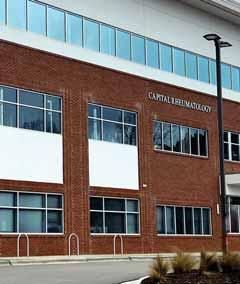
DRI has provided state-of-the-art imaging services for nearly 40 years. Now in the Raleigh area, we hope you will let us care for you and your family. We offer immediate appointments and exceptional care in a beautiful, comfortable environment. • CT Scan • X-Ray
MRI
Ultrasound • Cardiac Scoring • Lung Screening
• Virtual Colonoscopy
Wakefield Professional Plaza 11009 Ingleside Place Suite #103, Raleigh 919.521.8311
Hours: Monday–Friday, 8am to 5pm DR I healthgroup.com
Oct. 27 | 4 - 7 p.m.
Each October in Cary’s Bond Lake Park, jack-o-lanterns set sail across at dark, creating a whimsical, water-borne display. Come to view the spectacle or bring your own carved pumpkin to float. (Pumpkins must weigh around 8 pounds and be about the size of a basketball; bases are provided.) Before the flotilla, enjoy live music and food trucks while you wait for the sun to set. Then find a spot on the edge of the lake to watch the evening’s big show. Free; 801 High House Road; carync.gov.org

Oct. 28 - Nov. 4 | Various times
In 2012, restaurateur Angela Salamanca started the Day of the Dead 5k, a race that benefits the Brentwood Boy & Girls Club. The race will take place on Oct. 28, with costumed runners heading up Wilmington Street, through the Historic Oakwood Cemetery (visit wakebgc.org/dod for more info). And this year, Salamanca will expand one element of the event, the ofrenda, an altar to honor lost loved ones, in Oakwood Cemetery. Artist Peter Marin will create an installation that expands the ofrenda to mimic the layout of the pyramids of Teotihuacán in Mexico, with two main ofrendas and five small ofrendas in the field near the entrance of the cemetery. It

will be accessible all week to make offerings, with programming including an inaugural ceremony on Oct 27th, a screening of Coco on Oct. 29 and a Catrina parade on Día de Muertos, Nov. 2., each with music and food trucks. “We’re creating a place for the community to celebrate, grieve and come together to remember our loved ones,” says Salamanca.” Free; 701 Oakwood Avenue; historicoakwoodcemetery.org



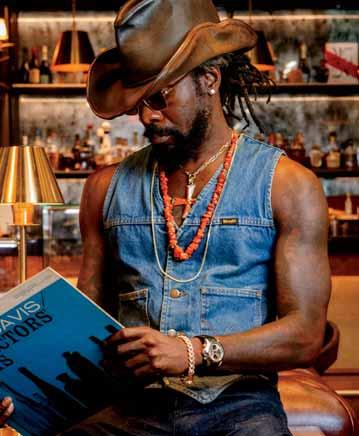
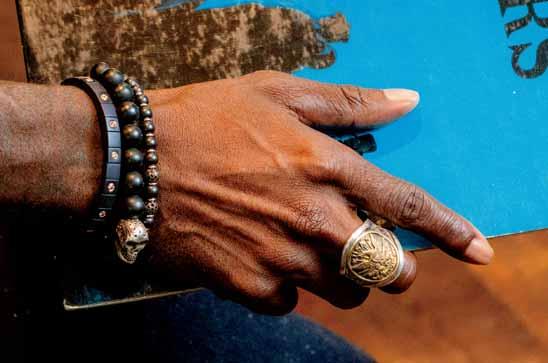




We have partnered with experienced local manufacturers to offer brand new cabinets to the public. All proceeds support Habitat’s mission to build affordable homes right here the Triangle. When you invest in quality cabinetry through the ReStores, you’re investing in the future of your community.

Renovate with heart and style: your dream kitchen could make someone's dream of homeownership come true!



Littleton is a tiny town in Halifax County, about 70 miles north of Raleigh. Population: 674. There, photographer Joshua Steadman discovered the Cryptozoology & Paranormal Museum, by accident.
“It was an interesting building; unassuming and odd,” says Steadman. The
cinder-block building was rectangular, with “stuff painted on the outside: A UFO. Bigfoot. And a Mars Attacks! sign, just like the movie poster,” Steadman remembers.
The carpet was dark. So was the lighting. “There’s a big Bigfoot, a lifesized statue when you walk in, and it was full of paraphernalia,” he recalls.
Shelves displayed castings of footprints — mostly attributed to Bigfoot — with labels that noted the different areas they were discovered and to whom they likely belonged. There was a map marking suspicious sightings nearby and a wooden coffin; there were dolls locked in cases to control any movement (one was Jerry Mahoney, the ventriloquist
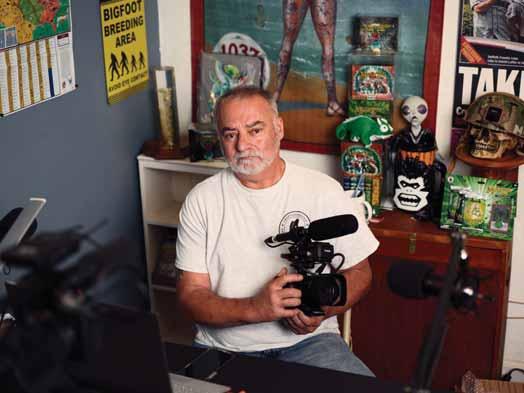
puppet) and shrunken heads.
At the time, Steadman was on assignment, so he didn’t have time to explore. But about a month later he went back to learn more, this time with his 14-year-old son in tow.
The museum is the brainchild of Stephen Barcelo, a former New York City photojournalist who left a changing news industry, retired and moved south in 2011. He’d planned to settle in to an easy life of family time, with a bucket list idea to travel Route 66.
Growing up on Long Island, New York, Barcelo loved historical tales of the paranormal surrounding lighthouses on the island. He remembers the real-life murder in Amityville that inspired a series of horror films laden with paranormal phenomena, and he followed the conspiracy theories around the Montauk Project, which allege that the U.S. government conducted secret experiments on children in the 1970s and 1980s (stories that inspired part of the Netflix series Stranger Things).
But as Barcelo was renovating the
historic home he shares with his wife and two daughters, he discovered that it had a history of suspected paranormal activity. Then, in 2016, a neighbor reported a sighting of a creature in the woods behind her house. “It was very
“We’re not trying to convince anybody that any one thing exists or that anything is real.” — Stephen Barcelo
large and its hair was super long and it was running so fast,” Tifanie Merrill told CBS 17 at the time. “It wasn’t a bear and it wasn’t like a coyote. I’ve never seen anything like it whatsoever.”
Spooked, Merrill reportedly left Littleton for good — but it ignited curiosity for Barcelo. Since then, he’s been interviewing folks, recording them and taking photos. He even turned the front half of his home into a museum to
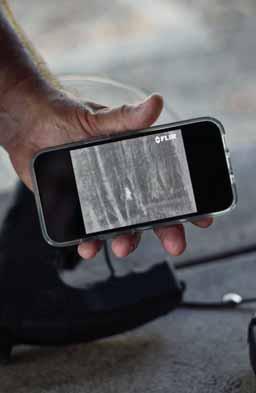
showcase his findings. (He also happens to be the town’s outgoing mayor: In 2017, he campaigned with a sign that read “Bigfoot sez: Vote Stephen Barcelo Commissioner Littleton, NC.”)
Barcelo recently moved the museum out of his house and into a new 3,700-square-foot space, where it’s open weekdays from 1-5 p.m. and from 1-6 p.m. on weekends. The building houses the museum, offices and a studio to record podcasts for YouTube. Barcelo has spent the last few months settling in, refurbishing and adding displays and working on a new UFO Section.
The museum delivers what its name proclaims: cryptozoology is the “search for and study of animals whose existence has not been proven” and animals considered extinct. Think dinosaurs and creatures that exist only in myths, legends or reported sightings. The museum features what he believes to be evidence of ghosts; lake and river “monsters”; and UFO stories.
Anyone who visits “will likely find something they like or something
they’re interested in,” says Barcelo, who also leads ghost tours, paranormal and Bigfoot investigations and excursions to track cryptids. He and his team wear body cams looking for evidence of prints, hair and sightings for the museum’s documentary-style YouTube podcast. “Sometimes, we spend days camping out,” he says.
In April, following a two-year, pandemic-forced hiatus, more than 300 investigators, researchers and enthusiasts attended the museum’s annual Paranormal Bigfoot Festival at Littleton’s Lakeland Cultural Arts Center. They heard from keynote speakers and authors, explored vendors and tried activities centered on the paranormal and cryptozoology. “We’re not trying to convince anybody that any one thing exists or that anything is real,” Barcelo says. “We want them to make that judgment all by themselves.”
So far, the most convincing Bigfoot sighting Barcelo says he has experienced was at Medoc Mountain State park, about 12 miles from the museum. There, he says, a thermal image yielded multiple shots of a creature moving. “We could hear movement and we could see something moving,” Barcelo says, assuring it wasn’t a bear or deer. “It was humanoid, upright, no clothes. I was taking pictures as fast as I could. I don’t think it knew I was there or, if it did, it didn’t seem to care.” Barcelo made his way downhill to issue a warning to other members of his crew: “We have company.” They all shut off their head lamps and joined him up the hill. Once there, they heard a crash, but heard and saw no more before returning to their campsite, Barcelo says. When Steadman and his son, Vaughn, came back for their visit, Barcelo gave them a taste of one of those research trips. “He immediately offered to take us on a hunt,” Steadman says, adding that Barcelo told them lots of stories as they hiked. “We listened and looked, but we didn’t find anything. Still, we had a good time with it!”






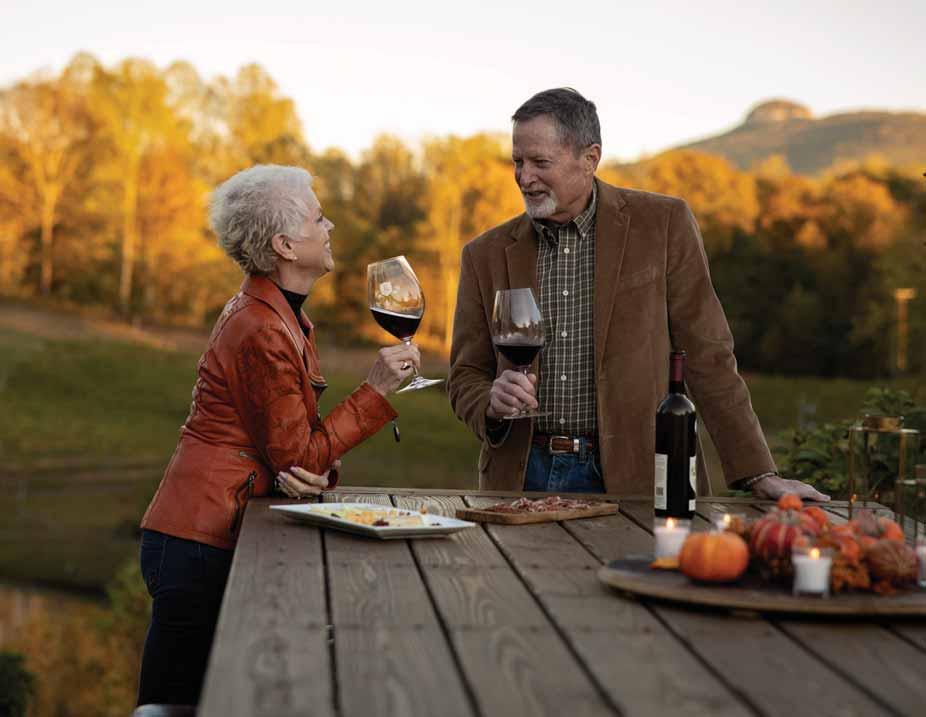








A new book about Rounder Records tells the history of an influential Americana label
by DAVID MENCONI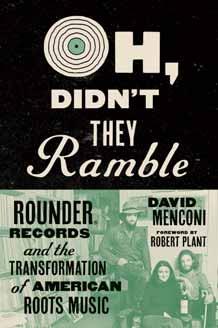

In Oh, Didn’t They Ramble: Rounder Records and the Transformation of American Roots Music, WALTER music columnist David Menconi tells the story of one of the most remarkable record companies in American music history. Since 1970, Rounder Records has released thousands of albums of everything from bluegrass to the sleek 21st-century space-folk of Robert Plant and Alison Krauss, helping to curate the Americana ouevre. Before starting a label, Rounder’s three cofounders, Ken Irwin, Bill Nowlin and Marian Leighton (later, Marian Leighton Levy), spent years traveling around the country, going to folk festivals including the Union Grove Old Time Fiddlers’ Convention in North Carolina. This excerpt from Chapter Two traces one particularly memorable road trip that two of them took.



The summer of 1968 was when Irwin and Leighton took a road-trip adventure straight out of the pages of a Kerouac novel, one that happened more by accident than by design. A summer job fell through, leaving Irwin at loose ends, so he called Leighton with a proposition: Want to hitchhike across the country?
Why not?
It began in New York City, where they hired on to do a “drive-away” transport of a car to a buyer in Kansas, and that part of the trip went smoothly except for oppressive heat in a car with no air conditioning. But things went south when they arrived in the town of Phillipsburg, Kansas, on a Friday after business hours. The car’s buyer checked the trunk, discovered it was painted yellow, and realized he’d been sold a car with New York taxicab
miles on it. Furious, he refused to take the car, which left Irwin and Leighton at loose ends for the weekend. So they went for a swim in a lake and took in a baseball game with music afterward.
Come Monday, they sorted things out with the car and started hitchhiking to Denver, where they were taken in by a guy who seemed nice enough — until he turned out to be a drug dealer. Fleeing a bust, they spent a night in the men’s room of a downtown Denver office building (which had at least just been cleaned, fortuitously). Then they raised some cash selling beer at a minor-league baseball game, making an advantage of their bedraggled appearance.
“Get your beer from the beard!” the unshaven Irwin hollered.
The next day, they hopped a freight train in the downtown Denver railyard and set out for Salt Lake City, just like Woody Guthrie used to do. But it wound up being the most miserable experience ever, with heat intense enough to boil the water in their canteen. By the time they staggered off the train in Salt Lake City, their jar of peanut-butter provisions had melted enough to pour, and they were so depleted they could barely walk. Their heavy luggage didn’t help, as Leighton had brought along several thick books to read (plus a hairdryer). That would be enough train-hopping for one lifetime.
“I’d always wondered what it would be like to ride on a freight train, and I found out — not very good.”
— Marian Leighton Levy
“I’d always wondered what it would be like to ride on a freight train, and I found out — not very good,” Leighton Levy said with a laugh. “That trip felt like forever in both good and bad ways.
I think Ken was interested in it more as sociology, to incorporate into some academic stuff he was doing. I like more structure. So I did a lot of reading, and also some things I would not ordinarily do. Like getting on a freight train.”
From Salt Lake, they resumed hitchhiking west and made it all the way to San Francisco, staying with about 20 people in a crash-pad apartment where the only furniture were mattresses on the floor. Ever the avid reader, Leighton used that address to get a local library card and maintain her book habit. They panhandled for money and went to protests and free concerts at Golden Gate Park. Money was always tight, so when they went down to the Newport Pop Festival with Jefferson Airplane and Quicksilver Messenger Service, their group entered by charging through an entrance en masse.
At the end of the summer, Irwin and Leighton took the long way home, hitchhiking down to Tijuana, Mexico. They spent a week with a family there, an amazing experience except for the hepatitis they both contracted (which they would not discover until returning home). Then they picked up the “Main Street of America,” U.S. Route 66, and hitchhiked east to Nashville, taking in a Grand Ole Opry show at the Ryman Auditorium before turning north toward home. They made it just in time for the start of fall semester classes.
“We had all but one ride from truck drivers, who basically adopted us,” Irwin said. “They thought we were these starving little hippies, so they bought us meals, let us sleep in their trucks. One of our final rides was from some servicemen who snuck us into Fort Dix, New Jersey, and let us spend a night in the barracks.”
Leighton spent all of 11 cents on that homeward journey, a doughnut for a dime and a stick of gum for a penny. Irwin, whose frugality later became the stuff of music-business legend, had set out on the trip with $20 hidden in his sock. He still had most of it when they got back.

Because this stage of life deserves a grand stage.
A luxury life plan community in one of Raleigh’s most sought-after locations, Hayes Barton Place is scheduled to open late 2024. Nearly seventy percent of the residences have been reserved, so now is the time to find out if this is the right plan for you!
Discover exceptional senior living at hayesbartonplace.com or call 919.628.4619 to learn more.
If you’re stumped on how to dress on October 31, why not take inspiration from some local favorite spots to dine? Happy Ral-o-ween!
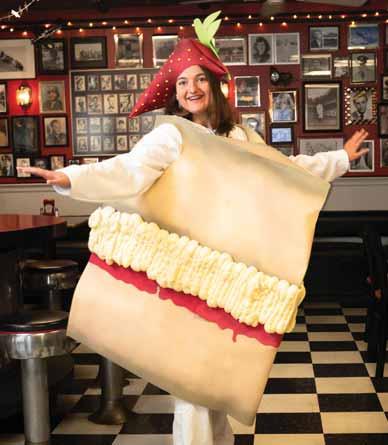

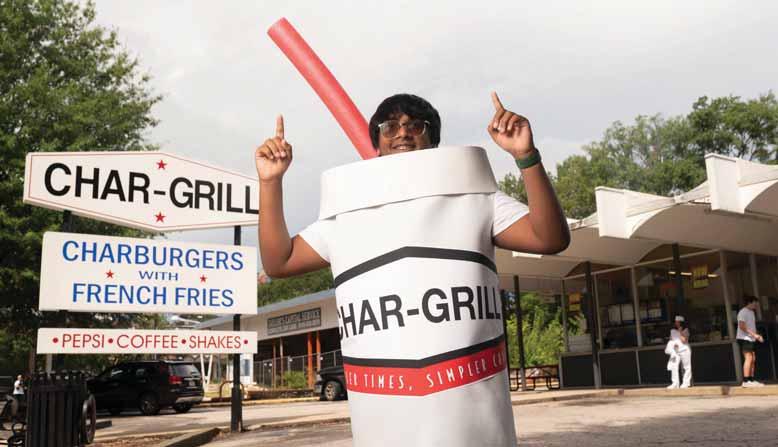
On the go? Consider this Char-Grill order, modeled by







Book in-person and virtual visits with providers who treat you right.
One Medical makes it easy to get primary care for your body and mind. Whether you visit us in our comfortable, modern offices or right from your phone, our providers and care team will make you feel seen, heard, and cared for.



Learn more at onemedical.com/WalterMag
Doctors on a first-name basis
Drop-in lab services
Dedicated member support
Next-day appointments
24/7 virtual care via message or video
Save $55 on your 1st year of membership. Use code: WalterMag




words and photography by MIKE DUNN
My first sighting of an elk in the wild was 40 years ago, in my favorite place on earth: Yellowstone. It was June, and the countryside was green with fresh vegetation. Driving into Mammoth, the park headquarters, it seemed like a scene from a zoo rather than a national park. Cow elk and a few calves were scattered all around the buildings, lounging in the grassy areas and generally ignoring the hundreds of people swarming the hotel, shops and visitor center. Yellowstone elk are wild, and signage, as well as park literature, warns visitors not to approach them, especially cows with calves. This experience was a decade before the reintroduction of gray wolves to the park, and driving through the rich landscape, I saw literally thousands of elk, scattered throughout the open sage flats and grasslands.
A few years later, I took friends on a Yellowstone adventure
in September. At that time of year, the landscape was mainly brown save for the golden aspens, and the elk were putting on a different kind of show. It was the season of the rut, when dominant bull elk, now sporting impressive antlers, were vying for the right to mate. And that’s when I heard my first elk bugle — a long, whistle-like scream followed by some low grunts. I remember thinking, That doesn’t sound like something that should come out of such a massive animal.
Almost 20 years later, I was leading a teacher workshop in Cataloochee Valley in Great Smoky Mountains National Park (GSMNP) in western North Carolina. It was dawn on a cold Saturday morning, and frost crystals decorated the grasses in the meadow. A huge bull elk strutted out across the field eyeing a small herd of cow elk nearby. The breeding season was winding down, but he was still intent on maintaining his herd. Another large bull was across the road. We watched in


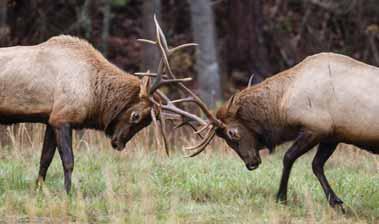
amazement as the dominant bull walked toward the intruder, neck outstretched, and then let out a bugle. That was the first elk bugle I heard in my home state, and it brought to mind the wildness I always feel when out West.
That bugling bull looked different from the ones I saw in Yellowstone. He sported some elk “bling” — bright-colored ear tags and a leather radio-tracking collar. He was one of the first elk to be reintroduced back into their former range in our mountains, and the National Park Service was keeping a close eye on him and his friends. The workshop was in late October of 2003, two years after the first elk were reintroduced into the Smokies. Historically, elk were found throughout much of the East and roamed the mountains and foothills of North Carolina, until their disappearance from our state around 1790 due to hunting and habitat alteration. In 2001 and 2002, after decades of discussion about how to return the elk to the state, the National Park Service decided to reintroduce 52 animals from Kentucky and Manitoba, Canada, into Cataloochee Valley. More than 20 years later, our elk population now numbers around 200 animals in a large swath of public and private lands in and around the valley.
Elk are one of the largest members of the deer family. In NC, they are considered the largest land mammal (larger than most black bears), with bulls weighing more than 700 pounds and standing 5 feet tall at the shoulder. They are 8 to 10 feet in length from nose to tail and can carry impressive antlers weighing more than 40 pounds that have a spread of 4 to 5 feet. When a big bull steps up onto the road in front of your car, you realize how massive these animals are. Cows are generally smaller and do not develop antlers; they usually give birth to a single calf in May or June. Elk feed on grasses and wildflowers, as well as leaves, fruit and twigs of shrubs and trees, and are capable of consuming up to 20 pounds of vegetation in a day.
The mating season, or rut, is from September through early November, and the most dominant bulls gather herds of cows (called harems) for breeding. Bulls spend much of their efforts
gathering the cows and warding off potential rival males, and bugling is an important part of that ritual. If another male is determined and seemingly equally matched, a struggle may ensue, with the bulls lowering their heads and locking antlers in a sparring match. These battles occasionally result in injuries to one or both combatants, but more often, the lesser bull retreats to try again another day. Once the rut is over, bulls may gather together in bachelor herds. Outside the rut, elk may travel far and wide in search of food and cooler temperatures. Cows and calves remain in a herd throughout much of the year, but often isolate themselves to give birth. They rejoin the herd once the calf is able to keep up, at about two weeks of age.
There are several good places to view elk in our mountains: Cataloochee Valley and the area around the Oconaluftee Visitor Center in GSMNP; up on the
Blue Ridge Parkway near Cataloochee; the nearby town of Maggie Valley; and the land of the Eastern Band of Cherokee Indians near Cherokee. Best viewing times are generally early and late in the day. Fall is a great time for elk viewing because they gather in larger groups for
and narrow, and it can get crowded on weekends in autumn between the elk and fall color.
Historically, elk were found throughout much of the East and roamed the mountains and foothills of North Carolina.
the rut. (Spring and summer may find elk and their calves feeding in fields, but seeking shelter from the heat in the adjacent forests; winter is the toughest time to observe them, as many spend more time in the forests.) Visitors to Cataloochee need to be aware that the long gravel road into the valley is quite curvy
If you go to see the elk, please observe responsibly and obey the rules — elk are large animals and can be dangerous, especially during the rut or when calves are present. Within GSMNP (and this is good advice everywhere) you must stay at least 150 feet away from the elk. It is also important not to feed them or any other wildlife you encounter. In the park, visitors are required to stay out of the fields when elk are present and to view them safely from the roads using binoculars and telephoto lenses.
I applaud the many agencies and individuals that have worked so hard to bring back this important piece of wildness to our state. And I encourage you to make a trip to see and hear these majestic mammals.
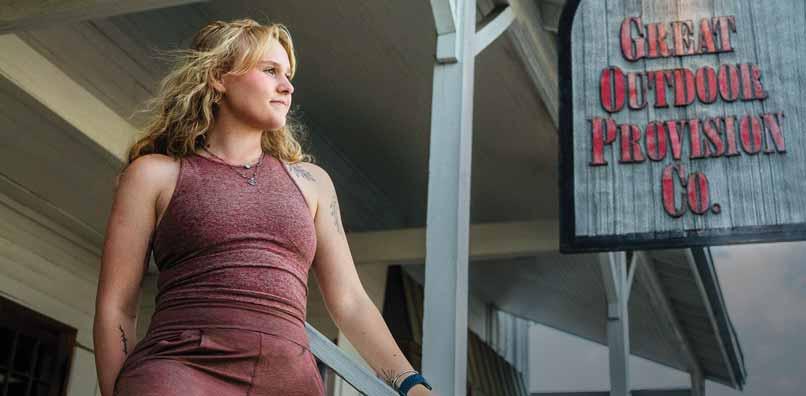






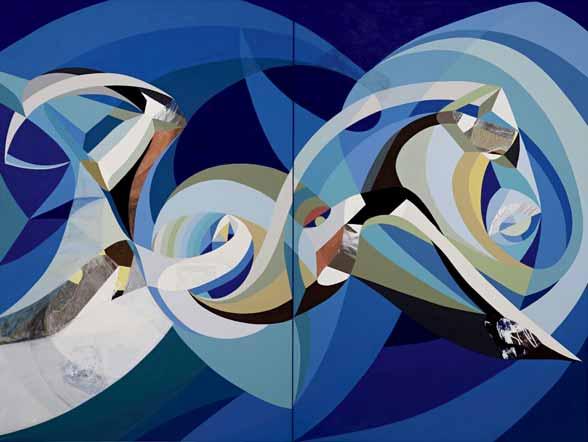
Abstract painter Chieko Murasugi has navigated conflicting perspectives all her life. She holds a Ph.D. in visual science and works as an artist; she is the Tokyo-born daughter of Japanese immigrants who was raised in Toronto and lives in America; she is a former impressionist painter who has turned to illusion to anchor her geometric art.
“I want to make the elusive, confusing, multifaceted nature of the world absolutely clear,” says Murasugi. “I want to be clear in my view that the world is unclear.”
Illusions underpin this message; her interest in them is one of the few things that has remained constant in her life. As a scientist, Murasugi studied visual perception because she was fascinated by mysteries like 3D illustrations that seem to flip upside down or right-side up depending on the angle
of the viewer, or the ghosts of afterimages, or the way the interpretation of a color changes depending on the colors that sit beside it. Now, as an artist, she uses phenomena like these to tweak a viewer’s perception, to make a picture plane shift before their eyes, to turn it from one thing into another.
She populates these paintings with crisp, unambiguous, flatcolored shapes. “I have clarity and I have ambiguity at the same time,” she says. “And that’s really at the crux of my art. It’s the ambiguity, the clarity, the dichotomy.”
Her art creates it, and she’s long lived it. Murasugi grew up in a “very white” Canadian suburb, “very clearly a minority.” As a child, her father, a descendent of 1600s-era samurai, showed her maps of Japan’s former reach across Asia, and told her “Americans took it away.” He told her about how American forces firebombed downtown Tokyo, and how he and her
mother barely escaped with their lives.
But these were not facts she’d been taught in school, or heard anywhere else. “I had taken world history, and I had not heard anything about the firebombings of Japan,” she says. “And so everywhere I went, I was presented with diverging, often conflicting, but very disparate narratives. Who am I supposed to believe?” When she was studying for her doctorate at York University in Canada, she recalls, her professors proudly touted the department’s significance in the field. Then she went to Stanford to do postdoctoral work in neurobiology and nobody had heard of her colleagues at York University. “Again, I had to shift my perspective,” she says. Fueling those shifts was an overwhelming curiosity, she says, “always wanting to know why. Curiosity has been the driving force of my life.”

“Curiosity has been the driving force of my life.”
— Chieko Murasugi
Years later, when Murasugi left her accomplished academic career and the world of science for art, her viewpoint shifted again. In a deeply rooted way, she was coming home; she had always drawn and painted, and she studied art in college as well as science. Even at the height of her successful scientific


career as a professor and research scientist, Murasugi believed that she didn’t truly belong. She thought she wasn’t quantitative, logical or analytical enough, that “there was something that was missing in the way that I was thinking,” she says. With art, the opposite was the case: “I knew I could do it.”
After she moved to North Carolina with her husband several years ago, this innate conviction took her back to school, to the University of North Carolina at Chapel Hill for an MFA. There she joined with fellow artists to co-found and co-curate an artist-run Chapel Hill exhibit space called Basement, which has earned a reputation as an incubator for emerging artists and which regularly exhibits their work to the public.
Over the last 18 months, Murasugi has found fresh directions, resulting in a new body of work, called Chance, that explores randomization, color theory and chaos. “My mother was basically dying when I began this series,” she says. “Her impending death, having to process her death, is what inspired it. And I continued it for about a year, because I was just bereft.” Murasugi’s mother survived World
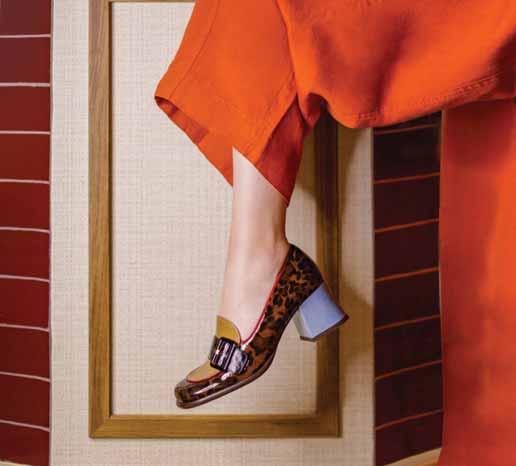

War II “by chance” and always thought of her life as defined by that good fortune; this fueled Murasugi’s experimentation with art made, in part, “by chance.”
Using an algorithm available on the website random. org to arrange her own colors, shapes and patterns into compositions, Murasugi created a series of vibrant, geometric works. In late summer 2022, she posted these works on the Instagram feed of Asheville’s Black Mountain College Museum + Arts Center, part of her digital residency with the museum. She also exhibited them at Craven Allen, her Durham gallery.
More recently, Murasugi has returned to the illusionanchored canvases she began a few years ago — what she now refers to as her “old way of painting.”
It has been “a huge struggle,” she says, because “the end point is unknown.” Unlike the work made with the guidance of the randomizing program, “the trajectory is not straightforward” with these newer, intuitive paintings. “It’s forward and backwards, left and right. I’ve always worked this way, before I went to the Chance series, and I’d almost forgotten how difficult painting is. Both fun, and excruciatingly difficult.” Some of the pieces currently underway will head to CAM Raleigh for a show called NeoPsychedelia that opens Nov. 10. She will also have a piece featured at ArtSpace’s ArtBash, a fundraising gala, on Nov. 18. Murasugi’s work has also been exhibited in museums in San Francisco, New York and across the South, and is in the collections of the City of Raleigh and Duke University.
Its abstraction welcomes any interpretation at all; its subtle illusory elements gently subvert them. “People have said to me over the years: Your work is so beautiful. And I think, well, I hope it doesn’t stop there,” she says. “But if they say, it’s so beautiful — Oh! And then it flips! I think, OK, good. As long as they see that there were two ways of looking at it.”
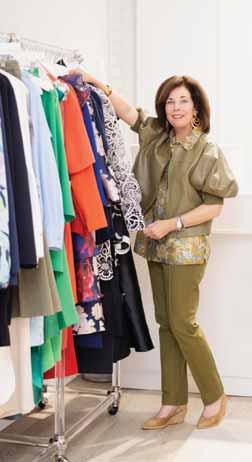

Come see us! Fall Fashion is arriving, and we want
Fewer Finer Things. 2603 Glenwood Ave. #171 Raleigh, NC 27608 919-886-0133
1805 Pembroke Rd. Greensboro, NC 27408 336-271-4767
Private Appointments Available Follow us on Instagram: @dresscodestyleraleigh
October 5 – October 31, 2023

…but with apologies to Sam Snead, not just yetby JIM DODSON illustration by GERRY O’NEILL

It began with a few simple questions on a beautiful October evening last year. My best friend — and oldest golf rival — and I were walking up the ninth fairway of the club where we grew up playing and still belong to. As usual of late, Patrick Robert McDaid and I were all square in our friendly nine-hole match.
As we approached our tee shots in the fairway, he suddenly said, “Can you believe we both turn 70 next year?”
I laughed. “If I forget, my aching left knee reminds me every morning.”
Pat also laughed. “Isn’t that the truth.” I could tell, however, that something else was on his mind, the benefit of more
than 58 years of close friendship. We began playing golf with — and against — each other the year we turned 12.
“Do you think we’ll take one of those trips again?” he asked.
We both knew what he meant.
Over the 40 years I worked as a columnist and contributing editor for several major golf publications, my oldest pal and I had roamed the Holy Land of Golf, as we call it — Scotland, England and Ireland — more than half a dozen times in each other’s company. We often went on the spur of the moment, with few, if any, arrangements made in advance, armed only with our golf clubs.
Before I could reply, he chuckled and
added, “Remember that time in Scotland when you locked the keys in our rental car and we had to stay another night at that guest house near Southerness?”
“How could I forget it? You’ve never let me live it down.”
“The owners invited their crazy neighbors over just to hear your golf stories.”
“Actually, it was your crazy fly-fishing stories they wanted to hear. You were more fun than a drunken bagpiper.”
“Good whisky helped.”
We hit our approach shots onto the green. I lagged my 20-footer to the edge of the cup and tapped in. As he stood over his 10-footer for birdie, he reflected, “I loved those trips. All those great old
courses and golf on the fly.”
As I watched, he rolled his birdie putt dead into the cup, sealing my fate with a 1-up victory. It was an annoying trend of late. His short game had gotten markedly better from years of regular practice, while mine had declined from benign neglect. I sometimes joked that moving to Pinehurst — the Home of American Golf, as it’s rightly known — was the worst thing I could have done to an aging golf game because I had no regular buddies to play with. I arrived there in 2005 a 2.5 index player and left a decade later a limping 10.5. All work and little play had left Jimmy one step closer to dufferdom.
“I’m thinking we should do it one last time before the boneyard summons,” Pat declared.
“You’re probably saying it because, for the first time in half a century, you’re regularly beating me.”
“That’s true,” he admitted as we walked off for me to buy the beer. “But it would be even sweeter to finally beat you in some of the classic courses you love best.”
Pat is a persuasive fellow. Some years back, while chasing the ball around Ireland, a mutual friend with a wicked sense of humor bestowed Pat the perfect nickname, “The Irish Antichrist,” owing to his supernatural ability to coerce a smile from almost everyone we met. More than once, I must concede, we’ve drunk for free for the evening.
Over his latest victory beer, I told Pat something Sam Snead said to me almost 30 years ago as we were playing the Greenbrier’s Old White course on a similar autumn afternoon. I was there to write about him for my Departures magazine golf column. Sam liked me, in part because I was good friends with his best friend, Bill Campbell, the legendary amateur, but also because I was a son of Greensboro, where Snead won the Greater Greensboro Open a record eight times, and where Pat and I were now sitting at the bar with our beers.
“How old are you now, son?” Slammin’ Sammy asked me that faraway afternoon.
“Just turned 40, Mr. Snead.”
“What a great age. That’s the prime of
life — makin’ good money, got a wife and kids, probably playin’ your best golf ever. I wrote a book about that called Golf Begins at Forty. You should read it.”
I promised to lay hands on a copy — when I got old.
“But here’s the thing,” he went ahead. “Someday you’ll blink your eyes and be 70 or 80 years old. It’ll happen that fast, you’ll hardly believe it. You’ll suddenly be saying farewell to golf. That’s when you better grab hold of as many golf memories as you possibly can. That’s the beauty of golf. If you keep after it, you can play till your last breath. No other game on Earth lets a fella do that.”
I watched him tee up his ball. “Just so you know,” he added over his shoulder, “I got plans to play at least to 100.”
And with that, 81-year-old Samuel Jackson Snead striped a splendid drive to the heart of the 17th fairway.
“So, who won the match?” demanded Pat.
“That’s not the point,” I said as we sat at the bar. “Sam was just sharing a little golf wisdom about enjoying the game as one ages.”
“Good for him. I guess this means we’re off to the Holy Land next year. By the way, I get at least four strokes a side.”
“No way. Three for 18,” I said firmly, pointing out the three-stroke difference in our official handicap indexes. This was nothing new. Over more than five decades, we’d argued about everything from the prettiest Bond girl to the absurdity of orange golf balls.
This year, over 10 days near summer’s end, in the 58th year of our friendship, we played eight classic British golf courses during the heaviest rains in England’s recorded history. It was a slog, almost impossible at times as gale-force winds blew our handicaps to pieces. Between us, we easily lost a dozen golf balls.
But we had the time of our lives.
A good friend, it’s said, knows all your best stories, but a best friend has lived them with you.
And somehow, unforgettably, we ended up in a tie.

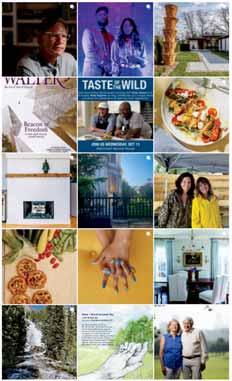





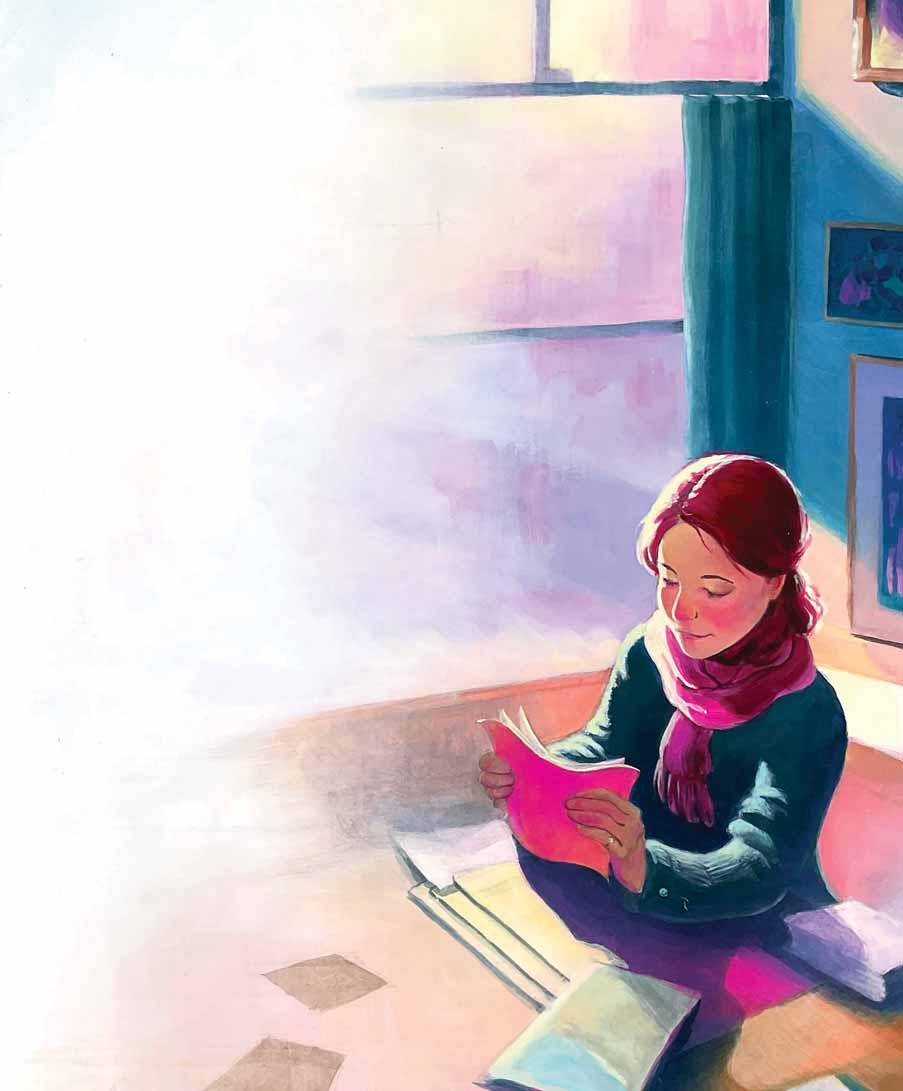

A pair of honest to God blue suede wooden clogs, a tiny chip of a diamond set into a yellow and white gold band two v-neck sweaters in navy and green, one with a button missing on the cuff, an eleven year old thank you note signed “Love, Mom” in shaky penmanship, a set of Michael C. Fina glasses (that neither of us have ever used) given for opening a bank account at First Union, a red scarf, thousands of yellowing photos, edges curled by age, the turquoise dress and jacket set you wore to my first wedding (the knot that didn’t stay tied): You, Mama, tucked into drawers, closets, and trunks, hiding out in my attic, in the set of my cheekbones, alive in the bridge of my nose, the name on my baby’s birth certificate.

Kelly White Arnold is a mom, writer, high school English teacher and lover of yoga. When she's not scribbling in notebooks or wrangling teenagers, she’s planning her next tattoo and daydreaming about traveling the world. This poem is offered with gratitude to Jaki Shelton Green, who said, “What we keep, keeps us.”



Whitney Otto tapped her passion for decorating in her elegant, family-filled home
In Whitney Otto’s century-old St. Mary’s Street home, you’ll find a classic, feminine style: pink patterned wallpaper, chinoiserie vases, rolled-arm sofas. It’s punctuated by creative design, unexpected patterns and fresh colors — an antique sofa covered in bold ikat fabric, or a bar done up in a dusty periwinkle — but also, occasionally, by a little boy rollerblading past a rose medallion temple jar in the formal living room.
Decorating this space has become a passion project for Otto, who shares the home with her husband, Josh, and their two sons. Whitney works in advertising for Hearst, on the business side of design magazines like Elle Décor, House Beautiful and Veranda. She has long had a passion for decor: when Whitney was a teenager and her friends were spending their allowances on clothes, she’d adorn her bedroom rather than herself. “I bought stencils and gold paint to decorate my ceiling with diamonds,” she says. “I was always buying something for my room.”
The Ottos bought their house in 2012 in a state of disrepair. It had cracked plaster, falling gutters, rust-marked original sinks, stained walls and a pink bathroom (and not in a good way). They gutted it that year to refinish the original hardwood floors, add new appliances and update fixtures to make it liveable. In 2022, they renovated again to suit their growing family, turning the L-shaped den into a breakfast room and adding a new den with a playroom on the second floor off the back of the house.
And all along the way, Whitney tapped her passion, along with design knowledge from her job, to slowly decorate her home. “I like to wait, be selective and pick specific pieces that I plan to have for the long term. So I invest in quality furniture, but I like changing out pillows and bringing home little things we find on our travels,” she says. “Much to Josh’s dismay, I’m never quite done!”
In the den, Whitney fashioned a show-stopping bar out of wasted space
below the stairs, complete with French bistro shelving, an antique mirror and a brass counter offset by lichen-green paint. Upstairs, she took her son’s collection of Hallmark sports figure ornaments and created a custom display for them with a shadow box she found on Etsy. In the tight laundry room, she created a neat wall of built-in shelves with labeled bins for each family member to make the most of the space.
As far as allegiances go, it’s a house divided between the Tar Heels and the Wolfpack. Whitney, who grew up in Charlotte, went to the University of North Carolina at Chapel Hill. Raleigh native Josh, an attorney at Wyrick Robbins, graduated from NC State (although he did get his JD at UNC). In fact, Josh was one of the last babies born at the old Rex Hospital that was located on the corner of St. Mary’s Street and
“My mom loves fancy things, like flowers and so many fabric samples, but she lets us race remote-control cars through the dining room.” — Charles Otto
But the home is more than a designer showcase; it’s packed with function for a lively family of four with an affinity for entertaining. There is a chair in the sunroom where 7-year-old Wells snuggles up with their dog George every morning for cartoons. Beneath the etoile chandelier in the kitchen, the island is often turned into a ping-pong table. “We’ve taught the children how to respect a house,” Whitney says, “but we live here, hard.” Her 9-year-old son, Charles, agrees: “My mom loves fancy things, like flowers and so many fabric samples, but she lets us race remotecontrol cars through the dining room.”
Speaking of racing: Sports, though an unlikely accompaniment to the fabrics and florals of the formal rooms, seep into the Otto home in all sorts of ways. The den, which has 12-foot ceilings supported by two massive beams of North Carolina tobacco wood from Raleigh Reclaimed, has doors that open to a patio where cornhole and roller hockey are on repeat. The wide, flat backyard sees its share of footballs and soccer balls. There is ample space for watching games in the sports-themed playroom, which includes a golf simulator. “Luckily, we’ve only gotten a few small dents in the ceiling,” says Charles.
Wade Avenue, just down the street.
The décor also pays homage to their home state. An entire powder room features Raleigh artists: it’s adorned with a trellis by artisan woodworker David Fuller and topped by 17 whimsical watercolor florals by Inslee Fariss. A piece by Raleigh-based artist Caroline Boykin hangs above the sofa in the living room. Many of Whitney’s antique pieces came from local dealer Robert Corprew, and the newer pieces are from High Point furniture makers.
Whitney also has five of her dad’s own paintings hanging in the dining room and outside of the laundry room, ranging from playful animal heads to delicate beach scenes. “If a fire comes, I’m grabbing the boys’ portraits and those,” she says, referring to the paintings of Charles and Wells in the living room done by Michele Anderson. With reupholstered antiques and ornate wallpaper, Whitney has created a home that is at once an aesthetic tribute to her passion-turned-profession but still an oasis for her house full of boys. In fact, decorating has led to a side job of her own design business, Otto & Co. Interior Design. “I believe in creating beautiful spaces,” Whitney says, “but also in living fully within them.”


In Whitney and Josh Otto’s home, they mix traditional styles with fresh, optimistic colors and prints. A piece by Raleigh artist Caroline Boykin hangs above a reupholstered antique sofa, which originally belonged to Whitney’s aunt, in the formal living room.


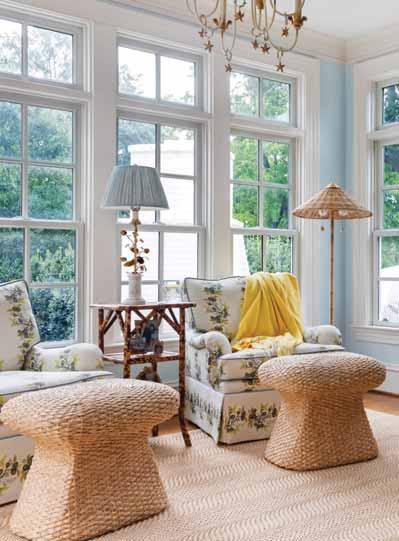
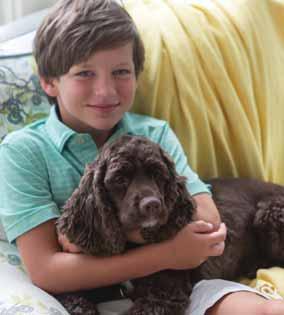
Opposite page: The breakfast area was part of a renovation the Ottos made to the home as their family grew. This page: The kitchen and the sunroom, featuring their son Wells and his beloved pup and roommate, George, in what is affectionately known as “their chair.”

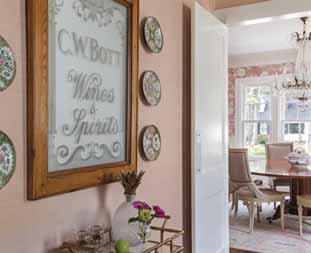
This page: Whitney says that the dining room is a work in progress, as she can’t settle on what drapes to install, a testament to the home’s constant evolution. A powder room on the first floor boasts watercolor paintings by Inslee Fariss atop woodwork by David Fuller. Opposite page: What’s now a butler’s pantry was once the home’s kitchen, before the Ottos renovated to make the house meet their active living and entertaining needs.






Opposite page: A 2022 addition to the home added the family’s most-used space: a bright living room on the main floor, with a playroom for the kids above. This page: Another view of the room and the bar (inset). It opens onto a patio and a large backyard


This page: Whitney and Josh’s bedroom is done in soothing tones of cream and blue, while their son Charles’ room takes a sportier tone, with the figurine display Whitney created hanging above his bed. Opposite page: A small, serene room off of the primary bedroom, which Whitney calls the “treehouse,” serves as her office.
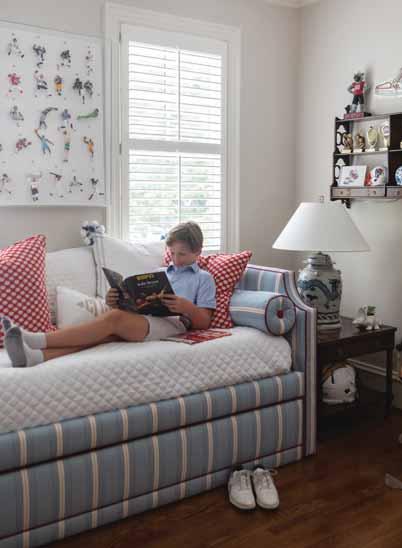

Preston Montague transformed his gravelly front yard into a thriving ecosystem


Preston Montague first got into gardening as an art student at the University of North Carolina Greensboro. “I rented a home in an eclectic college area, where the people who actively gardened were punks and Quakers,” he says of his neighbors. These two groups of people encouraged him to take up gardening as a hobby, which led to his career as a landscape architect.
On the surface, these two communities seemed different from one another. But, he explains, “They had a lot in common, most importantly living a mission-driven life and sharing resources with communities that have very little. They believed that gardens weren’t just for aesthetics, but a place to grow food to share.”
The neighborhood inspired Montague to put those ideas into practice. “My own yard in Greensboro was a place for people who didn’t have homes to call their own,” says Montague, citing a shed in his yard that occasionally served as a temporary shelter. He grew tomatoes and pepper plants in the front yard and welcomed people experiencing food insecurity to eat as they pleased. “Those individuals ate from my garden — that was tremendously powerful.”
During this time, Montague learned that he wanted to pursue work that was both creative and generative. “I really lucked out by discovering a love for gardening early on in life and having lots of people who are also excited about it, teaching me new ways to see,” he says. “Once you stop looking and start seeing, the world becomes more rich and exciting, and you just can’t help but become a more compassionate person once you really see the world in four dimensions.”
With an eye toward landscape design, fine-tuned through undergraduate study in fine art, Montague relocated to Raleigh in 2006 to pursue a degree in horticulture at NC State, an experience that he describes as “the most powerful education experience I’ve had.” When he graduated in 2008, he discovered that there were more career opportunities in landscape architecture, so he earned a master’s degree at NC State. Montague built a portfolio of landscape architecture projects including the Raleigh City Farm, a nonprofit urban farm on Blount Street that both sells and donates produce in the community, and Brie Arthur’s Food-
scape, a diversified garden that integrates edible plants into an ornamental landscape.
By fusing art and design with horticulture, Montague developed unique expertise. “Ultimately, my horticulture education taught me how to look for clues, using plants to make the invisible visible,” he says. “Plants can tell you how the soil is composed, they can tell you how stormwater is behaving, and they can tell you if they were an appropriate choice for the environment in which you planted them.”
These lessons did not come easily. When he launched his solo landscape architecture practice in 2020, one of his first projects — his own front yard in Durham, where he moved that same year — was almost a complete failure. “Originally, I specified lots of native plants, which I assumed would be successful because they are from this climate,” he recalls, “but I miscalculated the microclimate, which overruled lots of my planting decisions.” Plants that were native to mountainous regions or wet habitats were not conducive to the hot climate and gritty, gravelly soil on Montague’s property. “It just fizzled out,” he says, “and within a year it was obvious I had to reinvent the landscape.”
This reinvention included keeping the few plants that survived, which, ironically, were non-native Mediterranean herbs. “What the herbs were telling me is that my landscape was dry, hot and windy, so I began looking at environments that fit that description,” he says. Geographically, the sources of his inspiration were diverse: the tops of Hanging Rock in Greensboro, granite flats in Eastern Wake County, the Fynbos covered mountains of South Africa. “I began noticing that the plants in those environments have a shape or size that allows them to adapt to the stresses of that environment,” he says.
Montague’s garden now features Eastern Prickly Pear cacti, Echinacea flowers, Mangave succulents and lots of native herbs that better align with the microclimate. He uses mass planting, grouping large numbers of similarly shaped plants, to create density and give more stability to the soil. “One of the things I tell people is that often the answer to your problems is more plants,” he says. “By planting very densely, I crowd out weeds and negate the need for mulch. Plants are mulch.” Some of the groundcover plants in his yard include fuzzy Lamb’s Ear, pale


Preston Montague fine tunes his Geer Street yard with neighbor Katryna Robinson. “Katryna is my gardening buddy,” says Montague. “I don’t like to garden by myself. I like it to be a group activity. It’s exercise. It’s fellowship.” Though the garden is mostly self-sustaining, the off-months of winter are more active for Montague, he says: “I am collecting seeds, especially of plants that I love but can’t always find. I do a lot of planting in the cool season.”

 CURB APPEAL
CURB APPEAL



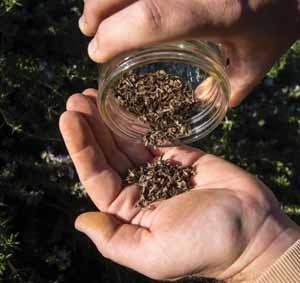

yellow Moonbeam Whorled Tickseed, Earliglow Strawberry and Oregano; Montague maintains a detailed master plant list that organizes the 50-plus trees, shrubs, flowers, herbs and succulents, each categorized by form, function and aesthetic.
Embracing the unique properties of his own garden taught Montague valuable lessons that he imparts to his clients. “It’s taken an enormous amount of time, critical thinking and experimentation to adapt what I’ve learned about native, ecological landscape design and maintenance to suit our climate and aesthetic preferences here in the Triangle,” he says.
Patience, priorities and trial and error are essential elements of the process. “Once I figured out which native plants would tolerate the stress of my home landscape, I was a much more successful gardener,” he says. And in the long run, the retooling paid dividends to him — in valuable time: “Now the garden is so resilient I don’t have that much to do. I barely even have to weed or irrigate! Instead, I weed other people’s gardens.”
For neighbor Katryna Robinson, Montague’s dedication for gardening is infectious. She first met Montague while they both served on the board of a nonprofit. “Preston’s passion for plants easily draws people to him, and to gardening!” says Robinson. Inspired by her upbringing in Haiti and her love of flowers, especially orchids, she planted Hibiscus and Canna Lilies in her own garden that remind her of home. She occasionally visits Montague’s yard, and for her the space evokes feelings of “peace, harmony and tranquility.”
For Montague, gardening is now a communal experience, both in its labor and the fruits of the labor; his garden in Durham reflects those early revelations back in Greensboro. “My front yard design isn’t for me, it’s designed for everyone else. I have boulders for people to sit on and plums, blueberries and strawberries for everyone to nibble on,” he says. “I’ve grown a neighborhood’s worth of Mediterranean herbs so that people can make awesome spaghetti sauce.”
The bees, butterflies and sparkling fireflies that all enjoy his garden are the icing on the cake. “That’s my favorite part of the landscape,” he says. “It went from desert to dessert in just a few years.”

Daniel and Susan Woodard Kelly’s airy, handmade home



and Susan

home in
resembles an ancient cabin from the outside, but inside is open and modern, filled with handmade touches.
Every component of Daniel and Susan Woodard Kelly’s home comes with a story, from the objects on display to the furniture to the structure itself. The original house in Capitol Heights, just under 1,000 square feet, was built in the 1940s using wood from an old tobacco barn. Over time, the planks have aged, giving it the feel of an ancient cabin.
In the bathroom, jars are filled with shells collected around the world. In one child’s room, fabric bird cages crafted by an artist friend hang from a mobile that Susan made. There’s furniture Daniel made from Pecky Cypress collected by Susan’s dad. Daniel highlighted the wood’s signature burrows by filling them with white resin. “I took the weakness of the material and made it an asset, design-wise,” he says.
And there’s the actual home. Daniel first moved into this house as a renter with a roommate in 2005 after graduating from North Carolina State University, where he studied art and design. He purchased the house in 2007, while working at the architecture firm Clearscapes, but soon rented it out to head to New Orleans for an artist residency. There, he reconnected with Susan, a Mississippi Delta native (who happened to have gone to summer camp in NC with Daniel’s sister). Susan had studied art at Louisiana State University, received her masters from University of Mississippi, and worked in floral design in New York City before returning to the area.
The two stayed in Louisiana for seven years, married and had two children. In 2016, they moved back to North Carolina. They lived with Daniel’s parents in Carthage for six months while updating this home themselves to suit their family. “We initially looked for a larger house, but then decided to renovate instead, because it was so special,” Susan says.
The main priority of the renovation was to make the space feel more open and bright. They tore down walls and removed doors to create a living area with a studio for Susan, a living room, dining area and kitchen. They gutted the kitchen, painted the walls white and replaced the floors with a graywashed pine. Daniel created renderings for a 300-square-foot primary suite addition to the home. To build it, they enlisted Jamie Dawson with Aspire Homes, using salvaged wood from the original structure and Capitol City Lumber Company.
While the home is technically finished, “we’re always working on something,” Susan laughs. Daniel agrees: “It’s constantly evolving — we’re always changing up the art, reconfiguring the spaces, fixing an old piece of wood on the front. We’ve removed walls, added walls — constantly pushing and pulling.”
Today, both work as full-time artists — Susan is known for her watercolors, and Daniel creates architecturally inspired fine art. Their walls are filled with their own work and pieces from fellow artists. Found objects and family heirlooms accent the home. It’s cozy, curated and handmade, a space that shifts with the seasons, as their kids grow and as the couple evolves as artists and humans. “It’s an ongoing experience that’s expressive of how we live,” says Daniel. Agrees Susan: “We want the house to be welcoming, happy and earnest.”

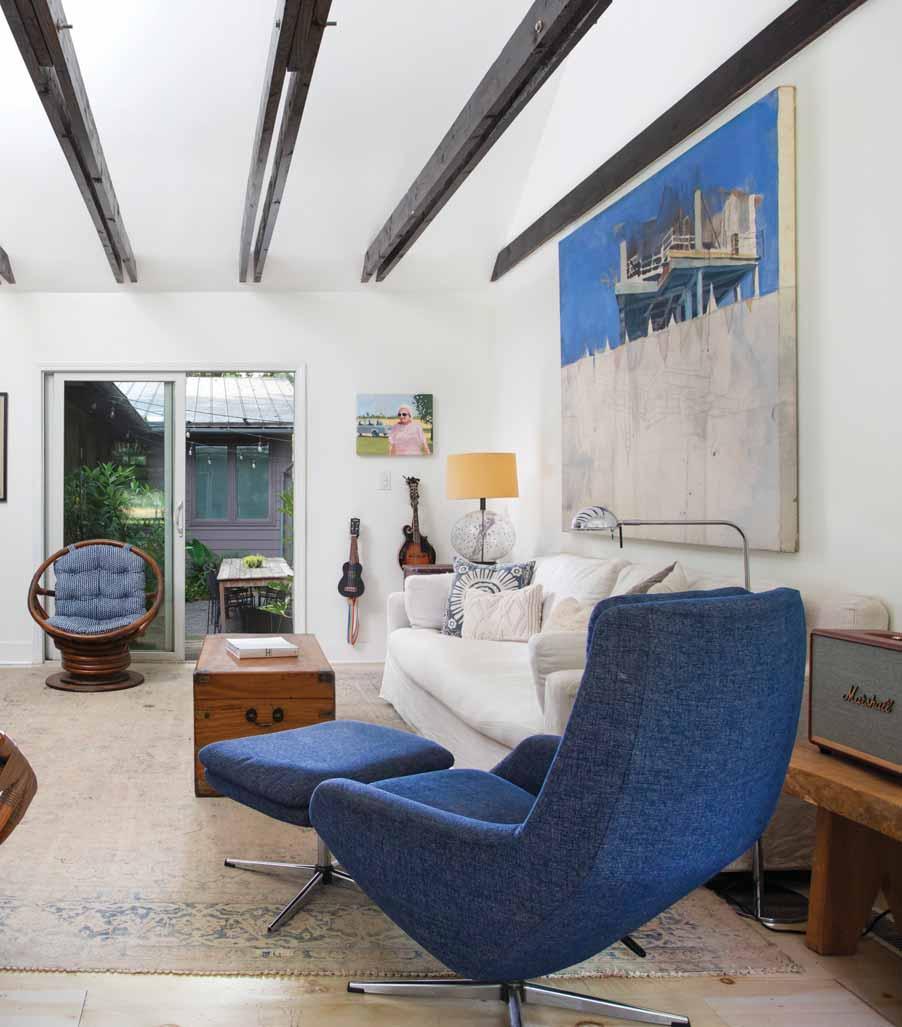

The inside of the home is “soulful and minimal to support the art on the walls,” says Susan, noting that the piece above the sofa is one of Daniel’s. He also made the bookshelf divider, which replaced a wall from the original structure. The blue chair is a Father & Son Antiques find that they recovered; the beams are original.



Clockwise from the top: IKEA kitchen cabinets and open shelving display a collection of McCartys Pottery made in the Mississippi Delta. In the dining area, a Louisiana dough bowl hangs on the wall. Susan’s dad originally built the dining table, and Daniel retrofitted it for space. Above it hangs a piece by New York artist Jeni Spota.



Clockwise from top left: Daniel did the renderings for the primary bath. The windows above open out completely. Susan made the painting in their daughter’s room; it’s inspired by bee hives, seashells and hornets. “I love to make work that’s based in nature,” Susan says. The swan and bird cages hanging from the ceiling were made by a friend, New York artist Tamar Mogendorff, and Daniel made the Pecky Cypress headboard. Their daughter Mary Martha made the critter houses on the wall.





Clockwise from the top: Daniel built the long, low shelf in their son Jeffrey’s room. The play couch is from Nugget, a North Carolina-based brand. The spare bathroom showcases smaller pieces including ones found at Wide Open Bluegrass and floral pieces by Oxford, Mississippi artist Carlyle Wolfe Lee. They found bluestone countertops through David Allen Stone. Susan’s studio overlooks the front lawn.



Clockwise from top left: Daniel built his detached studio at the height of the pandemic; it’s designed to match the main house. “I had wanted it for years and the pandemic was the perfect time to do it,” he says. The reclaimed wood came from his brother, in the Southern Pines area, and as he was sorting through it, Daniel found a timely artifact tucked between the boards: old News & Observer clippings about the 1918 influenza pandemic. The courtyard and garden area are tucked alongside the house. Here, Susan hosts art classes and dinner parties. “We love to be out here and entertain.”




Celebrating 170 years of the North Carolina State Fair

Under a crisp blue sky, the smell of deep-fried treats wafts over an enthusiastic crowd, the dings of games and whirs of rides mingling with a banjo strumming folk music. Inside, the smells are decidedly earthier and the pleasures subtler: the myriad colors and shapes of the feathers on prize poultry, the rich coats of muscled cattle rounding an arena, the quiet expectation on faces gathered around an incubator, waiting for a chick to peck its way out of an egg.
Since 1853, the North Carolina State Fair has shifted sites three times. It’s been suspended during wartime and for periods of tight budgets, it’s been delayed by a hurricane and canceled by a pandemic. But it remains a fall fixture in North Carolina, and here in Raleigh, we claim it as our own.
The fair’s origins stem from The Great
Exhibition of 1851 in London. This European fair offered a forum for innovators in everything from agriculture to artillery to show what they did and how they did it — historically, these sorts of fairs had been more of an opportunity for farmers and craftsmen to gather to sell their wares. For the first time, the fair became a place to instruct the public at large, and to support and create innovation.
In North Carolina at the time, nearly 90% of our residents worked in some aspect of agriculture. But many farmers were illiterate, as well as isolated by few roads and slow communication, so information was often passed along by word of mouth and tradition. The North Carolina Agricultural Society formed in 1852 with the purpose of raising funds for a fair to share practices. By 1853, they’d chosen a plot to hold it, 16 acres east of the then 1-square-mile town of Raleigh.
Notices were sent to all the newspapers in the state encouraging farmers
to bring items to show and asking them to stay and talk about them. As exhibitors reached the fairgrounds, they shared their names and what they would demonstrate. The Raleigh & Gaston Railroad was so enthusiastic about the fair that it offered round-trip tickets for half price and brought exhibits to the fair for free. The fair ran horse races for entertainment.
And people came! On one of its six days, over 4,000 people visited the fair — a huge success by the standards of the day. The Agricultural Society erected more wooden buildings, along with sheds and tents, for the 1854 fair.
The fair grew in size and success through 1859. In 1860, it was canceled as the state entered the Civil War, and it didn’t restart until 1869, after the early years of Reconstruction. By then, the buildings were in poor shape and the tents were gone. So in 1873, the fair



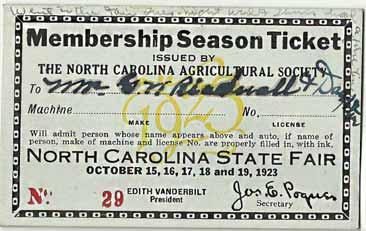

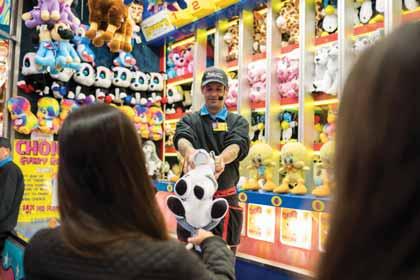








moved to a new, larger area on Hillsborough Street across from North Carolina State University’s current location. It’s now home to the Raleigh Little Theatre, and the former horse race track outlines its rose garden.
In 1926, the longtime sponsor and founder of the fair, the NC Agriculture Society, was too broke to continue. The NC Department of Agriculture took over responsibility, donating 200 acres at the corner of Blue Ridge Road and Hillsborough Street for a new site. Here, two large brick exhibit halls connected by an arched gate were completed in time for the 1928 fair. They still stand today as one of the entry gates.
Mired in the Great Depression in 1933, the state contracted George Hamid, an entrepreneur, to run the fair, but by 1937 it was back in the hands of the NC Department of Agriculture, where it has remained since. The fair was suspended during WWII, from 1942-1946, and then in 2020 for the Covid-19 pandemic, but has remained in its same location for nearly a century. In 1965, Black and white 4-H groups competed together for the first time. And in 1978 the fairgrounds
acquired an additional 144 acres of land, bringing the total to 344 acres.
Over time, the length of the fair has expanded, to 10 days in 1986 and to its current 11 days in 2008. The number of buildings has expanded, too, including the addition of the N. C. State Fair Livestock Pavilion (now known as J.S. Dorton Arena) in 1951 — then boasting the world’s first column-free roof — and the Exposition Center in 2005.
As the fair continued to grow, so did the scope of what it showcased. In 1878, a telegraph employee hooked a wire from the grandstand to an office building, allowing attendees to talk to each other using the newfangled telephone. Six years later, electricity was first used to light the fair. In 1894, there was a photography exhibit; in 1895, chicken incubators were a main attraction. The first telecast from a new educational television station, WUNC-TV, was broadcast from the N. C. State Fair in 1954. In 1958, staff from NC State operated an atomic reactor during the fair, alongside an exhibit of nuclear science. Topical science

Cary United Methodist Church is credited with offering the first of many concessions for sale at the fair: ham biscuits.
exhibits continued: in 1972, the fair sponsored the world’s largest space-related education exhibit, which included the Apollo 12 command module; there was a 1995 exhibit on CyberSpace, about information technology; 2001 brought an exhibit on biotechnology; and 2008 focused on environmental science. (That same year, the fair started its first social media accounts.)
Horse races and buggy races were the initial entertainment at fairs. In 1901, there was even an ostrich race (though it is unclear how many North Carolinians were raising racing ostriches). In 1910, auto racing was introduced; that same year an early barnstormer aircraft landed, using a New Bern Avenue golf course as a makeshift landing strip. In 1918, the fairgrounds were used by the Army as training grounds for another newfangled invention, the tank. In 1955 the World’s Championship Rodeo did nightly shows with more than 100 bulls and bucking broncos.
In the early 1930s, the first carnivalstyle acts marked the start of our modern midway. By 1939, the midway had grown to a mile long, with 50 rides. In 1949,

Carnival-style acts marked the beginning of the modern midway, which grew to a mile long by 1939. By 1949, Ferris wheels were a popular attraction.
1853 1916 1928 1930s

1873
An aerial
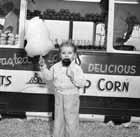
After the state agriculture department took over responsibility for the fair in 1926, it moved the fair to its current location, building two large exhibit halls connected by an arched gate in time for the 1928 fair.


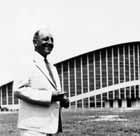
When the N.C. State Fair Livestock Pavillion — now known as the J. S. Dorton Arena — was built, it boasted the world’s first column-free roof.
The first telecast from a new educational television station, WUNC-TV, was broadcast from the N.C. State Fair.

The 2007 fair, themed Seriously Twisted Fun, shattered attendance records with 858,611 total fairgoers. This year, more than a million are expected.

In 1972, the fair sponsored the world’s largest spacerelated education exhibit, featuring the Apollo 12 command module.


In 2012, the fair introduced its first NC Brewer’s Cup Beer Competition. Now, the NC Public House showcases locally-made beer, wine, cider and craft soda.





Ferris wheels, merry-go-rounds and dare-devil motorcyclists were featured. In 1964, the nightly fireworks were introduced — alongside a 14-foot tall mailbox from the Post Office, where visitors could send out postcards from the fair. By the mid-2000s, more than 100 rides could be found on the newly expanded midway. In 2019, the largest traveling Ferris wheel in North America, the SkyGazer, treated guests to views of Raleigh from 155 feet in the air.
In addition, politicians and other noteworthy figures have entertained the crowds. Along with state legislators, five U.S. presidents have visited the fair: Teddy Roosevelt in 1905, Harry Truman in 1948, Gerald Ford in 1976, George H.W. Bush in 1992 and Bill Clinton in 1996. But today, you’re more likely to find a musical act than a politician on stage. The first Folk Festival was held in 1948 to showcase traditional North Carolina music and dance. By 2015, the Homegrown Music Fest brought more than 75
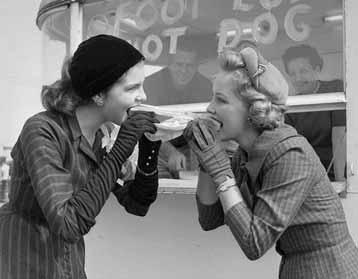



North Carolina musical acts across three stages.
The fair’s food has also become a form of entertainment in itself. In the early days, farmers brought preserves, cakes and pies to be judged. The first food booths on the fairgrounds were in 1900, run as fundraisers by churches and civic groups. The first concessions at the fair were ham biscuits, sold by the Cary United Methodist Church in 1916. Foot-long hot dogs were introduced in the 1950s, and in 1978 the NC State Food Science Club served its first ice cream cone. This year there will be a wide range of food, including once-a-year rarities such as deep-fried candy bars, cookies, ice cream and butter. As North Carolina has grown more diverse, so have the offerings, with international fare alongside Southern classics.
While the food and entertainment are certainly part of the appeal, the fair is
still true to its origins: a celebration of farming in our state. Agricultural exhibitions such as livestock judging, home economics and horticulture, and other farm related divisions remain under the state’s control. There are pig races, draft horse pulls and tractor pulls. Kids can visit the petting zoo and then go visit the animals entered to compete for prizes. Newer features include the NC Public House, showcasing local beer, wine, cider and craft sodas, as well as a kids’ decorating competition. In 2022, the fair received more than 36,000 applications for entry to its various competition categories.
This year, the fair will sprawl over 344 acres with an expected attendance of about 1 million. But should you want to go back to those 1850s origins, you can always visit the Village of Yesteryear, which first opened in 1950. There, you can take in heritage crafts like blacksmithing, basketry, pottery and spinning thread by hand — and marvel at how far we’ve come.




















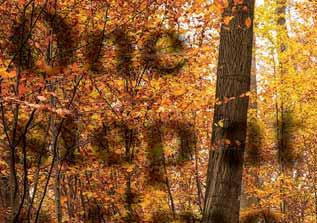

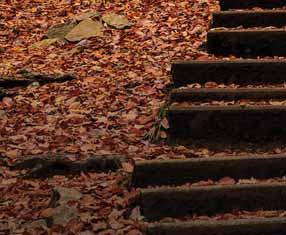

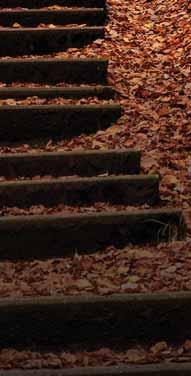

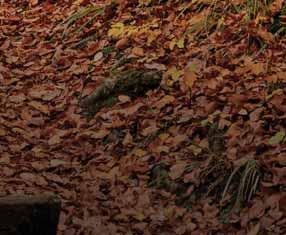





WALTER’s roundup of gatherings, celebrations, fundraisers and more around Raleigh.
85 Fab Foo Grand Reopening 87 Shelley Smith Reception
88 Ella West Gallery Opening 90 NCRLA Chef Showdown
93 Designed for Joy Anniversary 93 Coastal Urge Opening 94 Dix Park Inter-Tribal Pow Wow
To have your event considered for The Whirl, submit images and information at waltermagazine.com/submit-photos

FAB FOO GRAND REOPENING
The Fab Foo, a shop offering gifts and decor, has moved to 606 Wade Avenue. On September 6, grand re-opening festivities began with a party for friends and family, celebrating the move and the launch of Raleigh Cocktail Company — our city’s first cocktail boutique — located within the store.

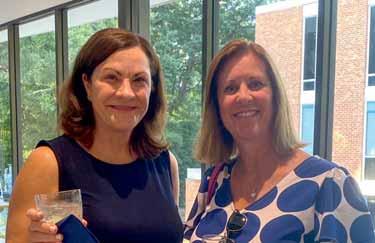









Wednesday, November 8 11:30 AM – 1:30 PM
NC State University Club Special guest Kristy White, For more information, call 919-256-6914 Come celebrate the




SHELLEY SMITH RECEPTION
On August 30, The Umstead Hotel & Spa hosted a reception for visual artist Shelley Smith, whose work will be on exhibit there through the end of the month.
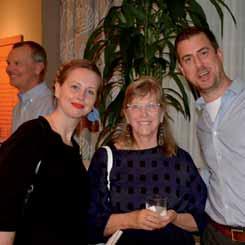



YOUR CAREER, YOUR CALLING.
Campbell University invests in each student. We prepare each one to make a life, to make a living and to make a difference. Our students are welcomed into an inclusive community of family, and mentored to become leaders who will impact the world. Inspired by our faith and belief in the power of education, we encourage each student to grow academically, spiritually and socially through the world of opportunities that surround them. Our students, faculty and alumni are energized with the charge to lead with purpose.
campbell.edu
On August 19, Linda Shropshire celebrated the opening of her new art space, Ella West Gallery. Located on Durham’s historic Parrish Street, the space was filled with artists, afficionados and friends from around the Triangle to celebrate. The first exhibit, Return to Parrish Street: A Dream Realized, features work by artists Clarence Heyward, Kennedi Carter and Ransome.
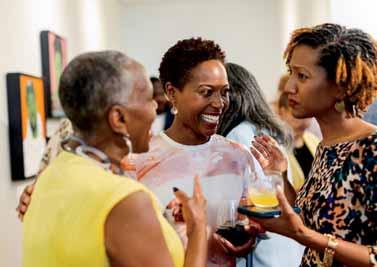
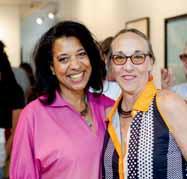

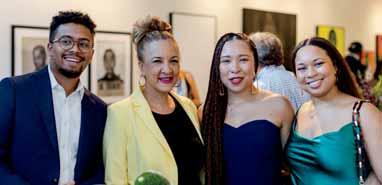
 BE. Noel, Charman Driver, Jocelyn Mitinaul Mallette
Trey Bradshaw, Robin Rivera, Taylor Grissom, Sydney Grissom
Morgan Crutchfield
BE. Noel, Charman Driver, Jocelyn Mitinaul Mallette
Trey Bradshaw, Robin Rivera, Taylor Grissom, Sydney Grissom
Morgan Crutchfield
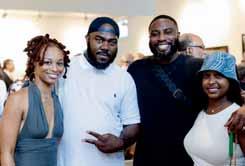

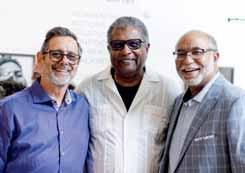



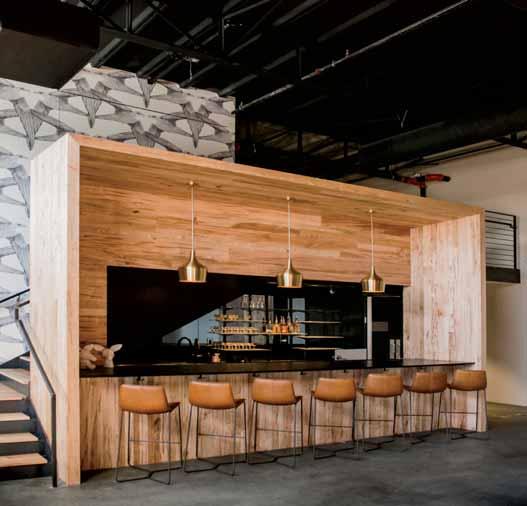
A versatile warehouse space 5 minutes from downtown Raleigh. Follow us @whitakerandatlantic to stay connected and visit our website for rental inquiries as well as our in-house event calendar.





of professionals has you covered! Follow us @poshnoshraleigh to stay connected and visit our website to inquire about how we can make your next event spectacular.




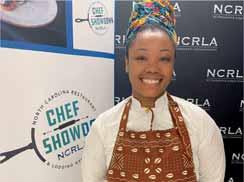
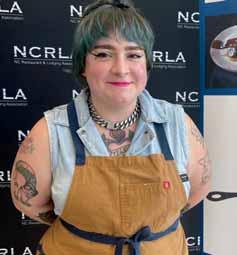
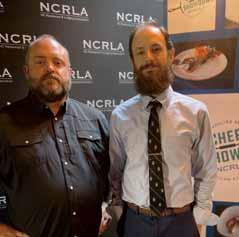

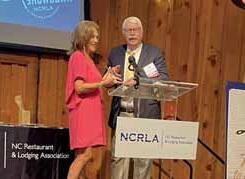



















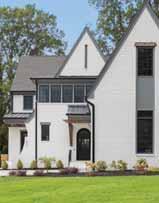





Designed For Joy hosted an open house on August 24 to celebrate the sixth anniversary of its W. Cabarrus Street location, with Visit Raleigh as its co-host. In its short history, Designed For Joy has helped 122 women, has provided $400,000 in living wages to women in crisis, and now has more than 400 volunteers.

On August 31, Raleigh businessman Claude Pope III, owner of Bald Head Blues and President of Coastal Urge, celebrated the opening of his second Coastal Urge store, this one in The Village District. Coastal Urge is a men’s and women’s apparel store founded on Bald Head Island.
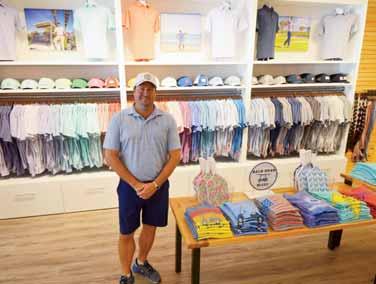


at Zest with our new seasonal menu, gifts, home decor + our Fall and Holiday 2023 collection www.zestraleigh.com


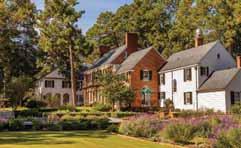


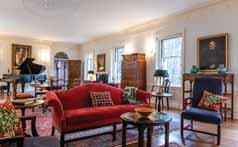
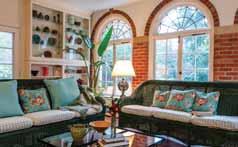

Nestled in the heart of Southern Pines, our historic Georgian Manor Boyd House and 26 acres of curated gardens and grounds provide an unparalleled backdrop for any get-together.
Planning a corporate retreat? Gather in grand style in The Great Room. Something more intimate? Book our cozy Boyd Library. For medium size meetings, our sunlit Garden Room and St. Andrews Room are ideal. When you host a dinner party in the original Dining Room overlooking our beautiful gardens, elegance abounds. Our Carriage House by the pond provides a private and idyllic escape. And what better place to host book club than surrounded by the spirits of literary luminaries in the NC Literary Hall of Fame, which has made its home at Weymouth Center for years.
Discover how we can help you elevate your meeting space. Let’s meet up. Contact us at: meetup@weymouthcenter.org
555 E. Connecticut Avenue
Southern Pines, NC 910-692-6261 • weymouthcenter.org

On August 26, members of
more

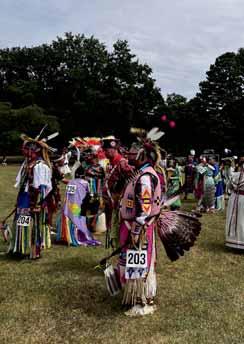 Anna Torres
DIX PARK INTER-TRIBAL POW WOW
Anna Torres
DIX PARK INTER-TRIBAL POW WOW









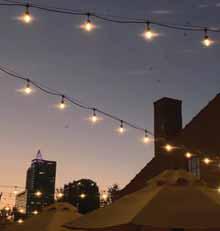
Just before twilight, the whirlpool begins: chimney swifts, by the hundreds or thousands, heading into cavernous spaces to roost. They swirl in a tightening circle, up to 20 or 30 miles per hour, heading toward tiny openings.
“It happens in cities and towns all over North Carolina at the same time every night, and most people don’t even notice it,” says John Connors, a naturalist with Wake Audubon Society. These “swirls,” as they’re called, are most obvious from late September through early October, when swifts are migrating from further north down to the upper Amazon regions of Brazil and Peru. (They’ll come back here the first or second week of April.)

During the day, chimney swifts fly nonstop, eating insects out of the air. “They’re masters of the sky,” says Connors. They’ll forage over lakes or big grassy fields, gobbling up mosquitos and flying ants.
Then, season after season, they head to the same chimneys for the night. When they get there, “they slow everything down, spread out their feathers and turn their bodies,” says

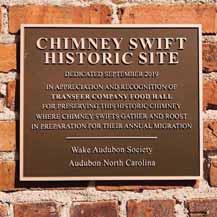
Connors. “They actually go in tail first!” Inside the chimneys, the birds grip the bricks with their claws to descend, then pack in like sardines, grooming their feathers before they go to sleep.
Some of the most common places for these swifts to nest are in the old chimneys of school buildings — around here, they’ve been seen at Broughton High School, Hunter Elementary School and Ligon Middle School, among others. “There are fewer roosting spots than there used to be; many of the schools have taken down the chimneys as they renovated the HVAC system,” says Connors, who along with Wake Audubon has been working with building owners to preserve spaces where the swifts can roost.
If you’re interested in seeing a swirl, just look up — or visit the events page at Wake Audubon (wakeaudubon.org) as they often host guided viewings downtown in peak season. “Usually, if you want to see something spectacular, you have to travel — but this is a phenomenon that happens right in front of us, every night, for a few weeks each year,” says Connors.

Your children. Your family. Your health. Your well-being. Your place.

From pregnancy and childbirth to mammograms, menopause and more, the care is as compassionate as it is comprehensive. Covering everything and anything female from outpatient and inpatient surgery to specialty and subspecialty care, and the most advanced technology. After all, when it comes to you, your health and your family, you’re the decision maker. And the decision is clearly WakeMed Women’s.
